December 27, 2020

The Contested Sign of Bethlehem
God speaks through signs, in the bible, nature, and personal events. For instance, through the Christmas celebrations. Christmas is celebrated throughout the world, even in non-Christian countries like Japan. It has become a universal day of celebration like the New Year. One does not need to know the meaning of Christmas to enjoy it. The word "Christmas" comes from Christ + Mass. When Christ is taken out of Christmas, God cannot speak to us through these words and signs. Christmas is full of signs of celebration and joy, but Christmas is also a contested sign.
When the angel announced to Zechariah that Elizabeth will bear a son, he asked for a sign. “You will be speechless” said the angel, “until the days these things take place.” The sign was that Zechariah would first lose and later regain his speech. Losing his speech was quite strange, but when he regained it at the promised birth of John the joy was all the greater. Now the whole town could celebrate saying, “The old man Zechariah speaks again! and he has son in his old age.” What kind of sign is this?
When the angel visited Mary to announce the birth of the Son of the Most High, she was also given a sign, that of the coming birth of John, because “Nothing is impossible to God.” If God can give a son to Elizabeth in her old age, what will happen at birth of Jesus? Divine signs are also an open window into the future.
The uneducated shepherds were the first to receive a sign about the birth of the messiah. “Today a savior is born who is Messiah and Lord.” What does it mean? A savior from what? How can a savior be Messiah and Lord? These words are a window into the future. “This is a sign for you: you will find an infant wrapped in swaddling clothes and lying in a manger.” This sign was easy to recognize, but how can an infant in a manger be Messiah and Lord? It took a long time to understand this window into the future.
God’s signs are often contested, as stated by Simeon: "Behold this child is set for the fall and rising of many in Israel, and to be a sign that will be contested and opposed.” Christmas itself becomes a contested sign when Christ is taken out of it. Thanks be to God that the whole world celebrates Christmas, but let us not take Christ out of it so that our Christmas joy be complete.
December 20-25, 2020

The Annunciation: finding grace before God
“Hail, O favored one! You have found favor with God.” The Almighty could have chosen another woman at another time; no one can claim to be deserving God’s grace. “All generations will call me blessed,” not because of personal merits but because “he has looked with favor on the lowliness of his servant.” God’s actions are gifts. Some get 10 talents and some only one. We do not know and cannot understand why. The ways of the Lord are inscrutable.
“Nothing is impossible to God.” This is the bedrock of hope, but most of the time God does nothing and seems absent. Prophecy in Israel became nearly extinct after the destruction of Jerusalem, except for a few minor prophets like Habakkuk shouting in prayer, “How long, O Lord, must I call for help? But you do not listen! “Violence is everywhere!” I cry, but you do not come to save us” Nothing is impossible to God, even doing nothing. Mary give birth to a child in an animal shelter, had to flee to Egypt, and for thirty years she saw nothing special happening. Where was God? In Advent our prayer is, “Where is God when we need him?” He is testing our patience and hope before coming.
“My soul magnifies the Lord because his mercy is on those who fear him from generation to generation.” We must magnify the Lord not because we have received ten talents rather than one, but because we have found favor with God, having been entrusted with one or several talents as a sign of his grace. Then like Mary we can sing at all times, “Magnificat anima mea!”
The Incarnation: Emmanuel, God with us.
“You will give him the name of Yeshua” (Jesus in Greek and Latin), which means Yahweh saves. “He will be called he Son of the Most High. He will reign over the house of Jacob forever and of his kingdom there will be no end.” This eternal kingdom is a promise that will only be fulfilled at the end of time. In the meanwhile, Jesus is the Emmanuel, God with us. As he stated, “I am with you always, even unto the end of the world.” (Mt 28:20).
Now let us all sing with the angels in heaven, “Joy to the world!” (the link may be slow to come up!)
December 13, 2020
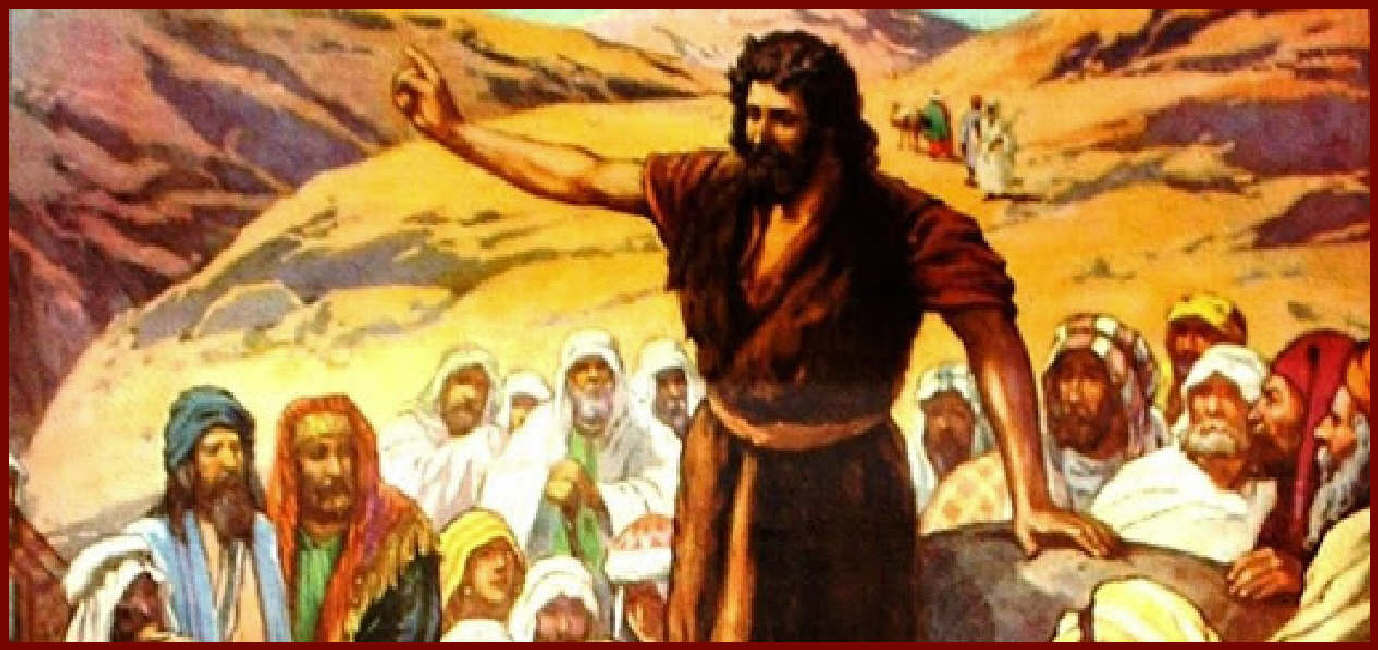
John the Baptist:
He must grow and I diminish
Continuing our four weeks of Advent reflections, we now turn to John the Baptist, and on Dec. 20 to the mystery of the Annunciation and the Incarnation.
“Behold, I send my messenger who will prepare my way, a voice crying in the wilderness ‘Prepare the way of the Lord.’” This voice in the desert was John the Baptist, the cousin of Jesus. He preached repentance and baptism for the remission of sins. There are many aspects to his personality: he was an ascetic, a stern judge, a friend of the lowly, and a humble forerunner of Christ.
John the ascetic prophet. John grew up in a small village of Judea and withdrew into the wilderness in early adulthood. His austere dress and died linked him to the tradition of the Prophet Elijah who was expected to return as the forerunner of the messiah. In the desert of Judea where he settled, there was also in Qumran a community of 100 to 200 monks belonging to the strict sect of the Essenes who lived a celibate life of prayer, scripture study, and community activities. The novelty of this religious fervor spread to the whole country, down to us in preparation for Christmas.
John the prosecutor. “You brood of vipers! Who warned you to flee from the wrath to come?” John was addressing some righteous opponents who felt no need of repentance in the name of Abraham their father. John warned them: “The axe is laid at the root of the tree. Every tree that does not bear good fruit is cut down and thrown into the fire.” These are strong indictments—you brood of vipers, the axe is at the root of the tree, you deserve to be thrown into the fire—these are words of fire and brimstone sermon against big sinners, as in the past. Not really for us.
John the merciful. Some people, the not-so-reputable tax collectors and soldiers, came to him in small groups or in private, asking for baptism in the river Jordan as a sign of repentance. Towards them, John was understanding. To the tax collectors he said, “Collect no more than appointed you.” And to the bully soldiers: “Rob no one by violence and be content with your wages.” Like Jesus, John did not put heavy burdens on sinners of good will.
John the way to Jesus. “Are you the messiah?” He was not. “Are you Elijah?” Only a forerunner of the one to come, like Elijah. “He is the Lamb of God who takes away the sin of the world. He who comes after me ranks ahead of me because he existed before me.” “He was at the beginning with God, and all things came to be through him.” This is the messiah to come who reigns forever. This is the messiah we celebrate at Christmas. Hence like John we must say: “He must grow and I must diminish.” This attitude is the best Advent preparation we can make.
You may like to listen and sing along, “O Come, O Come, Emmanuel.”
December 6, 2020

The Messianic hopes: comfort my people!
In our four weeks of Advent reflections we now turn to the messianic hopes; next on Dec. 13 we reflect on John the Baptist, and on Dec. 20 the Annunciation.
A few centuries after Isaiah’s prophetic promises to King Ahaz, the hopes in a coming messiah had become generalized. There were fewer prophecies in the form “thus speaks the Lord” but numerous expressions of the people’s faith in a messiah. Like kings and priests, the messiah would be “anointed” (the Hebrew meaning of messiah). Most importantly, he will restore all things in justice.
Shortly after the destruction of Jerusalem came an unexpected vision of hope rooted in the past. “A shoot shall sprout from the stump of Jesse, and from his roots a bud shall blossom. The spirit of the Lord shall rest upon him.” (Isaiah 11) These were words of utopian hope to the Jews deported to Babylon. Hope was needed to the point of unrealistic dreams: “The wolf shall be a guest to the lamb, and the leopard shall lie down with the young goat; the calf and the young lion shall browse together.” These were words of hope when there was no reason for hope; only faith in Yahweh was left to justify hope.
Several decades later, there was a political reason for hope because Cyrus was about to conquer Babylon and allow the Jews to return to their homeland. “Comfort, give comfort to my people. Prepare the way of the Lord. Make straight a highway for our God. Every valley shall be lifted up, every mountain and hill made low. Then the glory of the Lord shall be revealed.” (Isaiah 40) With Cyrus’s victory over the Assyrians, there were grounds for hope, but the expected return from exile did not happen as expected. In meanwhile people’s faith kept hope alive.
Two centuries later, the expectations became more explicit. “The spirit of the Lord God is upon me, because the Lord has anointed me. He has sent me to bring good news to the afflicted, to proclaim liberty to the captives, and release to the prisoners.” (Isaiah 61). Now hope was greater than ever, but nothing happened.
Who is this anointed one? “I gave my back to those who beat me, my cheek to those who tore out my beard. My face I did not hide from insults.” (Isaiah 50). Then as today, hope must be open to the unexpected, because the thoughts of the Lord are not like our thoughts, and his ways like our ways.
Hope is always hope in something, like hnope in a “king forever” or “liberty to the captives, and release to the prisoners.” What is our hope for Christmas? A child’s dream of many gifts under the Christmas tree? In the past, many of our dreams and hopes have been shattered because God’s ways are not our ways. Let our hope be Christ coming in our hearts! This is the angels’ message for Christmas: “Peace on earth to people of good will” to which we can respond with an endless “Glo-o-o-o-ria! Gloria in excelsis Deo”
November 29

God’s prophetic promise: king forever!
Here are our four weeks of Advent reflections: Nov. 29 the prophetic promises, Dec. 6 the messianic hopes, Dec. 13 John the Baptist, and Dec. 20 the Annunciation.
After David had brought the Ark of the Covenant to Jerusalem, Prophet Nathan proffered God’s promise to the king, “I will establish your throne forever. I will be a father to him and he shall be a son to me. Your house and your kingdom are firm forever before me; your throne shall be firmly established forever.” (2 Sam 7:13-16). David’s dynasty will last forever! The Jews believed it for centuries, that is, until their deportation to Babylon and the end of the Davidic monarchy. But doesn’t God’s “forever” mean forever?
“My thoughts are not your thoughts, and your ways are not my ways,” declares the Lord. “As the heavens are higher than the earth, so are my ways higher than your ways and my thoughts than your thoughts.” (Is 55: 8-9). For centuries and even today, people believe they can read God’s mind and be absolutely certain about it, as if God’s thoughts were similar to our thoughts. God sent his angel to Mary with the right interpretation: “God will give him the throne of David his father forever, and of his kingdom there will be no end.” (Lk 1:32-33). The kingdom of the messiah will last forever, not that of David. This is not what the Jews expected from Nathan’s promise!
In about 735 B.C. Jerusalem was attacked by a coalition of Syria and Samaria. “The heart of King Ahaz trembled like the trees of the forest in the wind.” The young prophet Isaiah went to comfort him with an enigmatic sign: “the young woman, pregnant and about to bear son, shall be called Emmanuel.” Which woman? Which son? The king and his court probably understood the sign, but historian do not, and they do not agree on any interpretation. We apply the image of the mother and son to Mary and Jesus, and rightfully so, but this sign became clear for Christians only seven centuries after it was proclaimed.
The prophecy of the woman bearing a son came with a dark warning: “Before the child learns to reject evil and choose good, the Lord shall bring you and your people such days [as have never been seen before].” Follows a description of the desolation of the land, in reference to the Assyrian invasion to come. The prophecy ends with a glimmer of hope: “O Emmanuel! Their plan will not be carried out. For ‘With us is God!’” God’s prophecies may be obscure, but they are always higher than our thoughts and our ways, and they always come with glimmers of hope.
Prophecies are not predictions about the future, but encouragements of hope in situations of despair; they are a call to be firm in faith so that we may be firm in everyday life. The prophecies about the coming of a messiah were not mainly predictions about the future but encouragements to hope in the present.
Christ is our hope. He is our Emmanuel. His kingdom will last forever and ever! This is our faith and our hope. Yes?
November 22
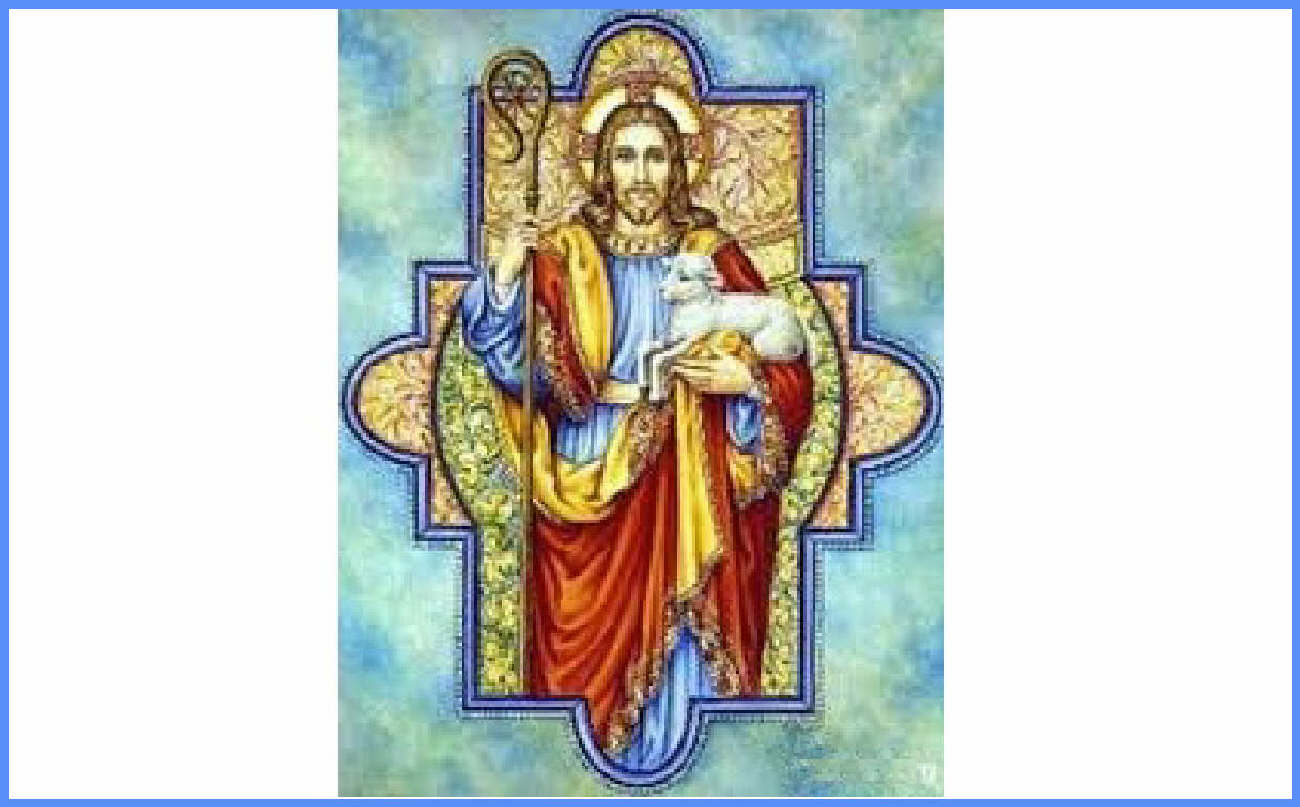
Christ King, Judge, and Shepherd
Today we celebrate Christ as the King and Judge of all nations, and also as Shepherd who knows and guides his sheep. In the Last Judgement, Christ will show both justice and mercy.
For centuries people have been afraid of the Last Judgement. Maybe at that time preaching only emhassized God’s justice. Or maybe they lacked faith in God’s mercy. It is not enough to have faith at one’s deathbed, or say one is saved by grace alone. Faith is an everyday demand. Faith is trust in God in all circumstances, but we often prefer to have faith in ourselves. Most often, when we arein trouble, we think about a “plan B” to get out of it. No. We should trust God first, and then think of a “plan B.” Faith should be greater than our own problem-solving plans. God’s vision of the future is greater than what we can imagine.
“You people of little faith, why are you so afraid?” said Jesus in the midst of the storm at sea. “Do not be afraid of those who kill the body but cannot kill the soul.” If we should not be afraid of death, what is there to be afraid of? “Take courage! It is I. Don’t be afraid” said Jesus when appearing to the barricaded disciples in their locked-up room. “Take courage” means: control yourself! Don’t be irrational and childish! When they heard “It is I” the disciples overcame their fears. In the gospels Jesus says about 20 times “Don’t be afraid.” Will we get the message?
“I am the good shepherd. I know my sheep and my sheep know me.” Jesus was the friend of sinners and tax collectors. He is also our friend. “I have called you friends, for everything that I learned from my Father I have made known to you.” If Jesus calls us friends, can be also say that we treat Jesus as our friend? We can measure our friendship with people by how often we visit them? like once a week? once a month? once a year? How often do we visit Jesus as our friend?
If we have faith, we become faithful servants. On Judgement Day Jesus will say, ‘Well done, good and faithful servant! Come and share your master’s happiness!’ This is what we would like to hear, and this is what we will hear if we have faith.
NEXT WEEK, ADVENT BEGINS. Four weeks of reflections: 1. The prophetic promises. 2. The messianic hopes. 3. John the Baptist. 4. The Annunciation.
“What we have seen and heard we proclaim to you."
This is the opening statement of the first letter of John: “What we have seen and heard..." For about three years, the Twelve lived with Jesus, sharing meals, witnessing miracles and wonders, and listening to teachings which at times were puzzled them. They had discussed, “Who is the greatest among us?” and argued with Jesus that a suffering messiah was a bad idea. They all fled when the promised kingdom turned into a tragedy, except John who stood at the foot of the cross. John was also the one who first understood that Jesus’ missing body did not mean death but eternal life. John and the others disciples had many stories to tell about Jesus. Actually, the gospel of John is mainly a book of stories; there is no mention of the beatitude, no sermon on the mount, and no discussion of divorce. The apostle Paul had no stories to tell because he was not one of the original witnesses; hence he preached doctrine rather than stories. Most people like stories and remember them better than doctrines.
The purpose of telling stories about Jesus is to create a fellowship of disciples similar to that of the Twelve around Jesus. The first Christian communities had all things in common, some people selling properties to help others in need. The Twelve had no property to share; they offered what they had: “What we have seen and heard, we proclaim it to you.” What Christians have in common at all times is the mandate to love one another. Fellowship consists of sharing, and sharing begins with listening to one another. I have visited small communities of ten or twelve (or even fifty) members who have been meeting weekly for years. One part of their meeting is mutual help: listening and comforting others in times of stress. Having others listening to you is by itself a great relief. In other communities, part of the meeting is to inquire about people in need in the neighborhood and doing something about it. A visit with flowers or sweets for the children can be a great comfort. This is what Jesus did: going around and doing good.
“I have told you this, so that my joy may be in you and your joy may be complete.” My joy is to be in you: this is the purpose of preaching Jesus stories. When we internalize these stories, we enter in fellowship with Jesus; and by sharing this fellowship with others, we create a community similar to that of the Twelve. “I have called you friends because I have told you everything I have heard from the Father.” Jesus shared everything received from the Father, thus creating a community of friends of God and friends of Jesus. It is this friendship with God and others that is the greatest joy one can hope for.
What are we doing to create such a fellowship? The purpose of marriage is to create a community of friends with relatives, neighbors, and across generations. Every family can be a fellowship with God. “By this all people will know that you are my disciples, if you have love for one another” (John 13:35.) This is a practice, not a doctrine; it is a practice for everyday life, not just once a week. Then our joy will be complete.
Next week we celebrate Christ our King, and the following week Advent begins.
November 8

From Peter: “Pilgrims on this earth,
refrain from the passions of the world.”
We are all pilgrims, whether believers or unbelievers. “All flesh is like grass, and all its glory is like the flowers of the field,” wrote Peter. The grass withers and the flowers wilt, “but the word of the Lord remains forever.” (1 Peter 1:25) For most middle-class people, this pilgrimage is rather pleasant and we have gotten used to it. If we are in good health and have a modicum of wealth, we can be satisfied with what we have. But the passions of the world incite us never to be satisfied, and always want more. More of what? Just what everybody else has: a nice well-paid job, a conflict-free family life, a comfortable and spacious home, long week-ends and extensive vacations, and a secure retirement. What’s wrong with that? Nothing! Except that is is like the grass that withers and leaves nothing behind.
Most of our lives are filled with trivia that leave nothing behind. Getting up in the morning: it’s rush time to get to work. Time for prayer? No: the passions of the world do not allow for it. But there is room at work for chit-chat with lots of gossips and tattletales. Reputations can be ruined, but these are the passions of the world. What can I do? Nothing! Addictions? I regularly see a family of four where both husband and wife flip through their cell phones while eating; one child of 13 watches his own cell phone at the dinner table and the child aged 4 is glued to his tablet nearly at all times. They all have their own preferred televisions shows which are like separate addictions. The main thing they do in common, all four together, is shopping.
“You are a chosen race, a royal priesthood, a holy nation, a people of his own.” We are not like the grass that withers and the flowers that wilt; we are part of the people of God that will remain forever. Hence, as pilgrims on this earth, we must refrain from things that wither like grass, and flowery possessions that do not last.
Peter is very complimentary of the people he writes to. He admires their faith in Jesus Christ. “Though you have not seen him, you love Him; and even though you do not see Him now, you believe in Him and are filled with an inexpressible and glorious joy.” I wish this were true of all of us today.
The letter ends with a call to vigilance, for no one knows when the Master will come back. “Be alert and vigilant. Your enemy the devil prowls around like a roaring lion looking for someone to devour. Resist him, standing firm in the faith.” This verse is sung at the daily office of compline, at the end of the day. When the sun goes down, many flowers close their petals for a nightly rest. The end of the day is similarly for us the time to recollect and reflect on the day in the light of faith. When did I resist the passions of the world? When today was I like glass that withers and leaves noting behind?
All Saints Day

In the company of saints,
our friends and guides
The saints were a major characteristic of the Catholic identity in the past. At birth, children were given the name of a saint. The anniversary of the feast of this patron saint was often celebrated more joyfully than the birthday. In a family of three or four children and quite a few cousins, one would be familiar with the name of quite a few saints. In the popular culture, the saints’ days constituted the calendar of the year, besides the major feasts of Christmas and Easter. There were special festivities at some of the saints’ days. Most of this is gone in the U.S. but these traditions are still alive and well in many places in the world.
At times there was some abuse in the past. Some saints were considered specialists and people went to them the way we go different doctor for different needs—like to St. Anthony for lost items, St. Jude and St. Rita for lost causes, St. Gerard for motherhood, St. Peregrine for cancer etc. People expected miracles, and even miracles-on-demand. Mary and the saints were often considered more powerful to answer people’s prayers than God himself. Of course, there was also much faith and trust in God.
Saints are not just intercessors. More importantly they are companions, friends, and guides for our daily lives. In the past, the memory of saints was transmitted by the popular culture. In my province of origin, St. Odile, the daughter of the duke of Adalrich, founded a monastery on top of a mountain in the 8th century. The monastery is still in use. It is visited by lots of tourists and pilgrims. It is also a place of perpetual adoration where volunteers come to spend a week-long retreat.
My cousin’s name was Genevieve, and St. Genevieve is the patron saint of Paris. The city was saved through her prayer from the invasion of Attila’s Hunts in 451. As children we learned about this in history classes. We also learned about John of Arc who delivered Orleans and had Charles VII crowned as king in Reims in 1429. The 17th century priest, St. Vincent de Paul, is very popular around the world. His story was popularized in the 1947 movie, Monsieur Vincent, still available. Many movies have popularized important saints, like Óscar Romero, who opposed the oppressive military dictatorship of his country.
What are the popular saints in your parish or country?
In his talk to the U.S. Congress in 2015, Pope Francis praised “four great Americans”: Abraham Lincoln, Martin Luther King, Thomas Merton, and Dorothy Day. None is a canonized saint but all four can be seen as friends and guides in everyday life. Lincoln is of great inspiration to students of public life, Martin Luther King and Dorothy Day to social activists, and Merton to reformers of religious life. It is through the examples of such exceptional figures that we find answer to the question “What would Lincoln/King/Day/Vincent de Paul, etc. do in my situation?”
A Christian life without familiarity with the saints is like knowing the English language without knowledge of the English literature, or claiming to know a country without knowing its history, or marrying a person without knowing his/her past. Without knowledge of the past, there can only be a foggy future. Without the examples of saints, we walk in the dark.
Today we must rely on books to become familiar with the great followers of the gospel. Here are two introductory books: A Living Gospel by Robert Ellsberg who interacts in the book with the heroes he describes: Dorothy Day, Thomas Merton, Henri Nouwen, and Charles de Foucauld. The other is My Life with the Saints by James Martin, S.J who describes his daily interactions with saints as friends and guides. Today, books are our best source of information about saints. Can you recommend one or two?
Are the Saints your Friends and Guides?
October 25

“All things were created through him and for him"
In God’s plan, all things come from God and return to him through Jesus Christ. The Christians’ goal should pursue is to reconcile all things in Christ and for him, not at the end of time, but in our everyday life (Colossians 1:16). Paul warned the Philippians: “Beware of dogs! Beware of the evil-workers.” In every society there are bad apples, bad examples that contaminate the whole body. It is not enough to condemn them because most probably we have already been contaminated and follow their bad examples of anger, bitterness, and polarization.
In times of political campaigns and elections, or just in the situation of confrontations in families, cities, and countries, we have to be beware of bad examples that contaminate all of us. In politics, most speeches are negative campaigning: they attack other candidates instead of outlining their own program. It is true that the best defense is attack. There is the negative attack of destroying others, and the positive position of offering solutions. This is also what often happens in family disputes: when attacked, we fight back rather than seek solutions. Here are some specific points.
- Limit your complaint or attack to one specific point. Usually an argument begins with one (often minor) issue, but it quickly degenerates into a general war. This is also the war of one political party against another. In an argument we tend to bring up all out the grievances of the previous week and of the previous month and past years. No! Limit yourself to one specific point.
- Argue over specific issues, not personal traits. Specific issues in politics are economic development, health care programs, poverty and social justice, criminal punishment and rehabilitation, unequal education, taxes, etc. Instead of proposing a plan, politicians like to attack the personality and the accomplishments of opponents. In many families there are specific issues that need to be addressed: unequal contribution to family chores, gender biases, television and cell phone addiction, overspending, laziness, unwillingness to learn and change, etc. Instead of discussion these issues, we tend to attack: “Your never help!” “You’re such a lazy bump!”
- Don’t use absolutes like “Your never,” or “you always.” Be aware that “never” is never right, and “always” is always wrong. Even if such statement is actually true, the use of absolutes sabotages the discussion. What can you replay to the accusation “You always…” except to explode in anger, “And you never listen to what I have to say!” This creates a stalemate of confrontation and polarization.
- Finally, Don’t lecture. Don’t shame. Don’t blame. Don’t nag. No sarcasm, no irony, no belittling. Don’t label. Don’t interrupt. No take-it-or-leave-it. No win or lose argument. All of these are common in political debates. Why is it so? Politicians do so in public because they probably do so in private; and when we hear these politicians, we imitate them in private.
God’s plan is to reconcile all things in Christ and for him, and we have to do our part to make it happen. Paul warned “Beware of dogs!” Not in order that we bark and bite back, but in order to bring peace and reconciliation. In the words of Francis of Assisi (click):
Where there is hatred, let me sow love
Where there is injury, pardon.
October 11
"For me, to live is Christ"
All Christians should be able to say so, but Paul adds, “to die is a gain.” To live or to die, “what shall I choose? I do not know!” No, I am not ready to die. Like Paul, there are still things I want to do, and hopefully make a contribution to the kingdom of God before I die.
Jesus did not want to die. He was in agony over his death. Most people feel they are still too young to die because they have a lot of things they want to do. I feel the same way. Jesus “emptied himself.” This is what sickness and death are: forms of self-emptying, giving up one thing after one another. Do whatever you can every day, but give up the rest.
Life is a slow process of giving up things. Choosing a career? You can only have one (or one at a time). Getting married? Then you give up a bachelor’s life. Reaching 40? By then you have give up many dreams. At 50 or 60 your career is soon coming to an end. After 70, we must give up one thing after another. Some people become cranky and grouchy at the sight of what they have lost, understandably. But we can also be grateful for what we have enjoyed so far, and look ahead with hope.
This was the attitude of Paul. “Forgetting what lies behind but straining forward to what lies ahead, I continue my pursuit towards the goal, the prize of God’s upward calling, in Christ Jesus.” (3:13-14) Forgetting what lies behind and straining to what lies ahead is the proper attitude of all creatures coming from God and returning to him. We all hear in ourselves the upward calling toward the prize of all things, Jesus Christ.
Jesus “became obedient to death, even death on a cross.” There is no possible rebellion against death, only hopeful acceptance. Daily life is hopeful acceptance of what is unavoidable, always pursuing “God’s upward calling, in Christ Jesus.” Then we will be able to say with Paul, “For me, to live is Christ.”
Next week we turn to the letter to the Colossians, with reflections for our times of crisis.
October 4

God’s gracious plan
to sum up all things in Christ
The main point of the letter to the Ephesians is given in a long sentence: “God made known to us the mystery of his gracious plan to sum up all things in Christ, in heaven and on earth.” (Eph 1:9-10). God’s plan is the gracious gift to reconcile all things in Christ, in the fullness of times, in heaven and on earth.
This message can be understood at two levels, one is cosmic and the other individual. At the cosmic level we already have reconciliation: “In him we have redemption by his blood and forgiveness of sins.” It is like a new beginning, a new creation, and a new covenant. At the individual level, we must become holy as God is holy.
At the cosmic level Christians are one people, without the division of gentiles and Jews. We are “one body and one Spirit, one faith, one baptism, one God the Father of all, who is overall and through all and in all. “(Eph 4:4-5) There is one cosmic universal church with Christ as its head. But this vision is hardly a reality: Christians are divided into many churches who ignore and even reject one another. Believers of various religions persecute one another: Christians are persecuted by Muslims who are persecuted by Hindus and Buddhists, while Jews have been persecuted by Christians. The vision of one faith and one church represents the eschatological future, “in the fullness of times.”
At the individual level, we are called to holiness: “He has chosen us before the foundation of the world to be holy and blameless before him.” (Eph 1:4) Paul repeated this call to be holy and blameless throughout his letters. To the Romans he writes in the opening paragraph that they “are called to belong to Jesus and called to be holy.” (1:6-7). He wishes that the Lord strengthens their heart “so that you will be blameless and holy in the presence of our God and Father.” (1 Thess 3:13). In the powerful words of Peter: “Just as he who called you is holy, so be holy in all you do; for it is written: “Be holy, because I am holy.” (1 Peter 1:15-16). These words echo Jesus’ teaching: “Be perfect (or holy) as your heavenly Father is perfect” (or holy, Mt 5:48)
Sanctification as spiritual transformation. In the past, this call to holiness was called sanctification. Today this term may sound obsolete, but the command “Be holy because I am holy” is not. Traditionally sanctification referred to works of piety and charity. Today the general emphasis is on being transformed into an image of Christ. In the words of Paul, “Put away the old self of your former way of life and be renewed in the spirit by putting on the new self, created in God’s way.” (Eph 4:22-24). This implies spending time in prayer and inner silence to hear God’s voice, and reading scripture to be informed by God’s word. It implies joining the church for Sunday Mass and getting involved in the parish.
There is also the purification that comes through the tribulations of life. We all have setbacks and failures. Depending on how we accept these failures we open ourselves to the love of God or closed up in bitterness. Imagine a child that never says “thank you” and always wants more. We behave like a spoiled child when we react with anger to undesirable outcomes. It is in the tribulations of life that we must practice faith in God and love of God and neighbors. God’s gracious design is to lead us to be open to love rather than closed up in bitterness and deception.
God’s gracious plan is to sum up all things in Christ at the end of time, and to transform all believers into holy and blameless images of his Son for eternity.
Next week we turn to the letter to the Philippians
September 20

“My power is made perfect in weakness”
“Three times I begged the Lord to be delivered [from a thorn in the flesh]” and three times his request was not granted. Instead, he was told, “My grace is enough for you. My power is made perfect in weakness.” (2 Cor. 12:9) There is much to be learned from this interaction.
1. We do not know what this “thorn in the flesh” refers to. So, we can speculate and apply the situation to us. One may think of a physical disability like an excruciating headache, bouts of epilepsy, or uncontrollable stuttering. We could also imagine a social situation like having a hyper-critical colleague or family member, or living with a husband, relative, or child who are self-destructive through uncontrollable spending, alcohol or drug addiction, destructive rage and violence, and constant disrespect for the dignity of others.
“My grace is sufficient for you” is better translated as, “Take courage! You can handle this! Have trust in God and yourself!” The worst outcome in any situation is to lose trust in self and God. In a bad situation the first reaction is to cry, “Help! Get me out of this mess! I need a miracle!” Ultimately when we are down, we must get up and climb the wall by ourselves. Headaches and epilepsy? Science can help. Stuttering? King George VI of England overcame it through patience. F.D. Roosevelt struggled with polio without success, but he gave hope to many through his Institute for Rehabilitation in Warm Springs, Georgia. Married to an abusive spouse? It takes courage to leave, if this is the only option. Drugs and addition? AA has saved many from self-destruction. By learning how to help ourselves we can also help others. Hoping for a miracle may an easy way out.
2. “My power is made perfect in weakness.” Inversely, God’s power is weakest when we feel perfect and in no need of help. Children are helped most when they are helpless. Students learn best when they acknowledge their ignorance. The worst patient is one who claims to know more than the doctor.
It is when we are down that we recognize more easily God’s help. Weakness stimulates open-mindedness to find an answer. Often the answer to our problem is at hand but we did not see it. It is when hitting bottom that that we seek help; it is when hitting bottom that alcoholics join AA. We all need the courage to change the things we can and the serenity to accept the things we cannot. It is in things we cannot change that God’s power is made manifest.
“I wait for the Lord more than watchmen wait for the daybreak, more than watchmen wait for the morning (Psalm 130). It is when we wait for the Lord and watch for his response that his power is made perfect in our weakness.
Here is the text and the music of Psalm 130 (click)
September 13

The church needs our help!
“Corinthians, the church of Jerusalem needs your contribution!” In chapters 8 and 9 of the letter to the Corinthians, Paul outlines basic principles for giving which are still valid today. Here they are.
1. Give yourself to the Lord, and then, at God’s inspiration, also give the church. According to Paul, the Macedonians “gave as much as they were able, and even beyond their ability.” How did they do it? “They gave themselves first of all to the Lord, and then by the will of God also to us.” In doing so, “they exceeded our expectations.”
Giving is the expression of our self-giving to God. All we have, we received it. All is gift; in sickness and death we cannot hold back what we lost. Gratitude would suggest that we offer back to God and to others what we have received, but our resources must be managed wisely, that is, “by the will of God.” It is the circumstances that will tell us what to give, how much, and to whom. Giving to the church may not be the best choice in certain circumstances.
2. Equality and justice. “Our desire is not that others might be relieved while you are hard pressed, but that there might be equality.” The purpose is not to deprive the rich and push everybody into poverty—which is what Marxism has done in quite a few countries. Today we may speak of justice rather than equality. Both justice and equality are socially conditioned. Some children may need more attention and more treatment than others; parents and teachers know that. The equality of all in universal deprivation is worse than inequality. Justice considers needs and human dignity; it is achieved through compassion rather than administrative hand-outs.
What are the needs of our times? They are numerous, and there is little we can do about them. What is God’s will and his inspiration to us? It is the circumstances that will tell. We come to know these circumstances through study and open-mindedness. By generously offering ourselves to the Lord we also come to know how to serve others.
3. Financial transparency at all times. Paul sends three of his most trusted companions for the collection. Why? “We want to avoid any criticism of the way we administer this liberal gift. For we are taking pains to do what is right, not only in the eyes of the Lord but also in the eyes of man.” He did not three men in order to increase social pressure for the collection, as we might think!
The rabbinical norms of the time required the involvement of three supervisors in food and alms distribution in order to avoid favoritism, mismanagement, and corruption. This is what Paul is doing. These three men will accompany him to Jerusalem with the collection. If Paul went alone and were robbed, he could be accused of embezzlement. He wants to void any possible criticism. In fact, two of these three men are “representatives of their churches,” not just his friends.
Financial transparency is easier today thanks to professional accounting and internet posting. Yet, there is often less transparency today than in Paul’s handling of contributions. Lack of transparency is often a major reason for non-contribution.
4. “God loves a cheerful giver. Whoever sows sparingly will also reap sparingly, and whoever sows generously will also reap generously.” In all families or groups there are stingy members. If invited, they do not invite back; if written to or called by phone, they do not reciprocate; if asked for help, they offer excuses. We all love cheerful givers!
“Who helps the poor lends to God.” This is a Jewish proverb that has become universal wisdom. We all love cheerful givers! So do the poor, and so does God himself.
August 16

Healing a bruised relationship
(2 Corinthians)
Most of the second letter to the Corinthians is about a bruised relationship (2 Cor 1:12-7:16). This is a topic we can relate to. I will summarize what we can learn from it and ignore what applies specifically to the Corinthians.
In this letter, the heart of the matter is a crisis about which we have no specific information. It seems that someone in Corinth seriously defamed Paul and tarnished his reputation to the point that the apostle felt rejected. It might have created a schism but the whole community sided with Paul. Problem solved. No! Bruised relationships need to be healed. Here is what Paul writes in his defense, in the part that also applies to us.
1. Paul presents the problem is a breakdown in communication and thus he deflates the tension. He was accused of being inconsistent and selfish because first he said he was coming, and next he was not coming, all at his personal convenience. Response: Paul had recently written a letter to the Corinthians about their scandal “with much affliction and anguish of heart, and with many tears.” As a consequence, “I decided not to come to you in these painful circumstances.” Advice to us: in painful circumstances it is better to let the dust settle down. Healing takes time. Also: keeping the channels of communication open deflates the tension.
2. Paul was anxious about the situation, and he wanted the Corinthians to know his feelings. “When I went to Troas, I had no relief in my spirit because I did not find my brother Titus” whom he had dispatched to find out what was going on. (2:12-13). Sometime later—this letter was written over several months—he was encouraged by what Titus told him about “your yearning, your lament, your zeal for me.” (7:7) It was important to Paul that the Corinthians knew about his care for them, and for him to learn that they cared about him. Mutual care and anxiety should be shared not buried. Good communication is a form of mutual love.
3. Modesty helps. Paul could easily boast about his superior knowledge of truth and error. He clearly stated, “we commend ourselves to everyone’s conscience in the sight of God by setting forth the truth plainly.” But at once he reminded himself and others that “we have this treasure in jars of clay.” We may feel convinced about the righteousness of our cause but we must always also include the possibility of being wrong. Any truth must be presented as in a fragile jar of clay.
4. A resolution should not include winners and losers. “The punishment inflicted on him by the majority is sufficient. Now instead, you ought to forgive and comfort him, so that he will not be overwhelmed by excessive sorrow.” Not only forgive, but help people forget the past so that no one is overcome by bad feelings. This is the debriefing stage in any painful interaction when both parties try to overcome lingering negative emotions.
5. Many conflicts involve emotional blockages or rejections that must be overcome. This process has two sides. “We have spoken freely to you, Corinthians, and opened wide our hearts to you. We are not withholding our affection from you, but you are withholding yours from us. As a fair exchange—I speak as to my children—open wide your hearts also.” (6:11-13). The first step is to open our hearts to others in the conflict; that is hard enough. The next is to ask others to reciprocate this open-heartedness, and that is very difficult. I would not know how to do it.
6. Finally, see the positive side of others. Paul had sent Titus on a reconnaissance mission, but instead of warning him about negative possibilities “I had boasted to him about you, and you have not embarrassed me. But just as everything we said to you was true, so our boasting about you to Titus has proved to be true as well. I am glad I can have complete confidence in you.” It takes great courage to say, “I have complete confidence in you.” Saying so it likely to produce it. Trust breeds trust as distrust breeds distrust. Let us be the sowers of peace and trust.
Next: The church needs your help! (Read Corinthians 8-9)
August 9

“Whether you eat or drink,
do everything for the glory of God”
Whatever we do, let’s do it in a way to make us proud of it. Let everything be to the glory of God and humankind. Philosophers have said it. Our parents have repeated it to us. Let us practice it.
Eating and Drinking. There is a food pyramid that indicates what experts consider balanced eating. We can eat as much vegetables, salad, and fruit as we like. We should probably refrain from too much pasta, potatoes, and rice. Milk, yogurt, and cheese are desirable supplements, but we may have to switch to non-dairy milk for the sake of the environment. More fish and less meat is probably desirable. Fat and sugar should be reduced. Such a balanced died will keep us in shape for many years.
Work is a problem. In recent times, “U.S. manufacturing employees work 320 more hours—the equivalent of over two months—than their counter-parts in West Germany and France.” In Western Europe everybody enjoys 5 or 6 weeks of paid vacation, and the legal length of the working week is 35 hours in a few countries. In an increasing unequal society, many Americans are overworked, and salaries for the middle class have been stagnant for years. Many people are caught in a vicious circle of increased work and increased consumption that is not to the glory of the nation or to the glory of God.
Sports. Our schools encourage competitive sports to foster team spirit and self-control. How much of it carries into adult life? “You should pray for a healthy mind in a healthy body. Ask for a stout heart that has no fear of death, that can endure any kind of toil.” This was the prayer of the Latin poet, a pagan, Juvenal (50-127). Sports has too often become a spectator activity, while our goal should be “a healthy mind in a healthy body.”
The Lod’s day has become meaningless for many people. The weekend is the only time we have to do chores and go shopping. In many ways, Sunday is practically no different from the weekdays. There is something wrong here. Even for people who go to church on Sundays, the Lord’s day is not anymore what it used to be. There is no going back, but there must be a going forward. On Sundays we should give priority to family and people over things. If possible, we should schedule a family activity or family outing. If possible, we should include cultural and learning experiences, rather than doling out time on the beach.
Politics. In this election year and times of racial tensions, let politics and political campaigning be to the glory of the nation and the glory of God. We are far from it, it seems.
“Whether you eat or drink, do everything for the glory of God.” (1 Cor 10:31). It’s not as easy as it sounds. Actually, it is pretty hard in our consumer society, but it is a pressing issue for us in our consumer society.
Next week we turn to the first eight chapters of 2 Corinthians: how to heal a bruised relationship, according to Paul.
August 2
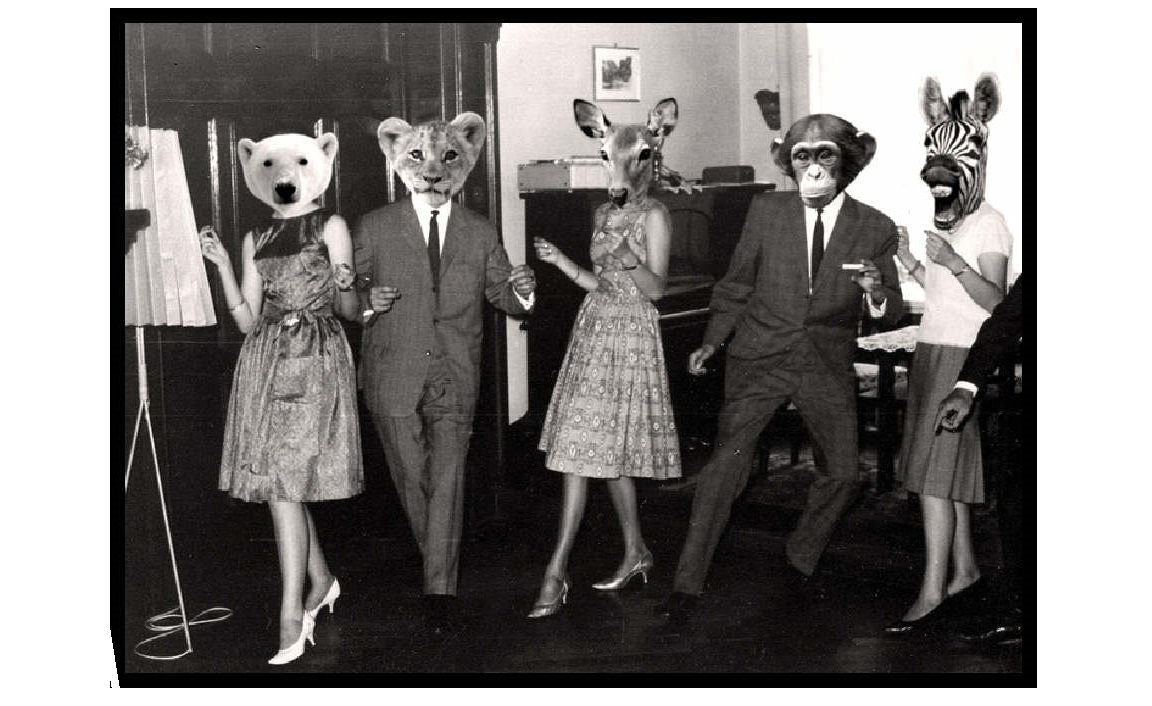
The flesh and the spirit:
The animal and the spiritual self
We are spiritual animals. We need food and shelter, but we also want more than that. We enjoy pleasure, but we also want pleasure for a purpose. Animals make nests, but we built palaces. Birds sing, but we write poems, songs, and symphonies. A few animals hoard food for the winter, we have created international capitalism, and many gains and evils that come with it.
This is a reflection on chapter 3 of the first letter to the Corinthians. We will see that for Paul, humans are flesh and spirit, and in a second point, that we are body, spirit, and soul. The first man (adam in Hebrew) and all humans after him are earthlings, taken from the earth (adama). We must take care of our bodies, our environment, our psyches, and our divine spirit. This is Paul’s broad message.
1. We can live just for food, shelter, and pleasure. Then our animal nature may lead, in the words of Paul—not always, of course— to “immorality, impurity, licentiousness, idolatry, hatreds, rivalry, jealousy, fury, selfishness, dissensions, drunkenness, orgies, and the like.” Paul calls these the works of the flesh.
In the New Testament, the “flesh” has many meanings. Jesus is the Word become flesh. In quite a different sense, “the Spirit of the living God [is written] not on tablets of stone but on tablets that are hearts of flesh.” (2 Cor 3:3) In still another sense, Paul greets his fellow Jews as “my kin according to the flesh.”
Paul likes to oppose the flesh and the spirit as opposite concepts, but they are not two contrary realities. The “flesh” produces immorality, idolatry, hatred, etc. but these bad behaviors have nothing to do with our physical flesh. It is more appropriate to describe these behaviors as coming from “fleshly people.”
2. More common in the bible is the tripartite distinction of body, mind, and spirit. We tend to think in terms of the body-soul dualism, as if the two were independent from one another. In this perspective we go to a medical doctor for the body and to a psychologist or priest for the soul. But this is a very narrow view, because our diet affects our mind, and our mental activities (like meditation and yoga) affect both the body and the spirit.
“God fashioned man out of the soil and breathed into his nostrils the breath of life.” (Gen. 2:7) Humans are physical earthlings endowed with psychic life and also a divine breath. We are body, mind, and divine spirit, all at once. In this perspective spiritual progress consists of using all three dimensions for the purpose of growth.
Body. Disciplining the body will have a direct effect on our spiritual wellbeing. In all religions people fast and follow diets: monks in Buddhism and Catholicism usually follow vegetarian diets. Physical exercise is most useful; all doctors recommend it.
Mind. It takes years of studies to become a good architect and build mansions. It takes years of study to understand scripture. As in the arts and the humanities, the study of the sacred books requires research and imagination. If you are a student of the bible, you should have a small biblical library to support your studies.
Spirit. Finally, our spirituality affects the body. In spite of their rigorous diet, monks often live long lives. And yes, God answers prayers, and miracles do happen. Our spirit is a parcel of the divine spirit of God that creates and re-creates the world. I have witnessed or heard about miracles in quite a few churches.
Let me conclude. Our inner struggles can be understood as a war between flesh and the spirit, but this war is best understood in the broader perspective of body, mind and spirit. We must take care of our health through diet and exercises, our mind through study and self-disciple, and our divine spirit through prayer, meditation, and mindfulness.
Read chapter 10 in the first letter tot he Corinthians to reflect on, "Whether you eat or drink, do everything for the glory of God."
July 26

“The foolishness of God is wiser than human wisdom”
The foolishness of God is Jesus Christ, that is, the crucified Christ. The image of a crucified man is nearly impossible to bear. The first Christians never represented Jesus crucified in their paintings and drawings. Even today it is as repulsive as lynching or stoning. How can this be the wisdom of God? (This is a reflection on 1 Corinthians 1:25.)
“I came to you in weakness and fear and much trembling, and my proclamation was not with words of persuasion and wisdom, so that your faith might not rest on human wisdom.” Paul tried human wisdom in Athens when addressing philosophers in the public arena but it was a failure. There he started his speech as an intellectual discussion but his listeners only wanted human wisdom. When he mentioned the resurrection, it was, “No, thank you!”
Paul came to the Corinthians full of awe (the meaning of “fear and trembling” in Jewish parlance) before the mystery of the infinite God. How can one not be in awe at the impossible and infinite wisdom of a crucified God? There is really no room for the human wisdom of rhetorical creations, as useful as they may be. The preacher must endeavor to express the depth of the wisdom of God rather than to translate it into socially pleasing or catchy phrases.
God’s mysterious and hidden wisdom has been revealed to us but not to the rulers and wise men of the secular world. His is a message which “the eye has not seen and the ear not heard.” But this mysterious wisdom should not make us despise the achievements of the wise women and men in the arts, literature, science, and technology. Today there is more equality and less hunger and suffering than hundred years ago thanks to science. The cultural achievements of Greece and Rome were outstanding in their time, and God’s wisdom did not take anything away from them. Today the digital revolution is creating a more unified world, which is a gain. God’s wisdom is just greater and more mysterious.
“We have not received the spirit of the world but the Spirit that is from God.” That’s not true today the way it was in Paul’s time. In the apostolic times, the Holy Spirit was given instantly with great power while today the Spirit of God comes slowly and in small doses. Most of us have received and continue to bombarded by the spirit of the world through the media which hold us captive. We must overcome it—which is hard— and seek the divine foolishness which is wiser than human wisdom. This can be achieved through regular reading and praying of the Word of God. Let us to that today
Next week: the flesh versus the spirit. Read chapter 3 of 1 Corinthians.
July 19
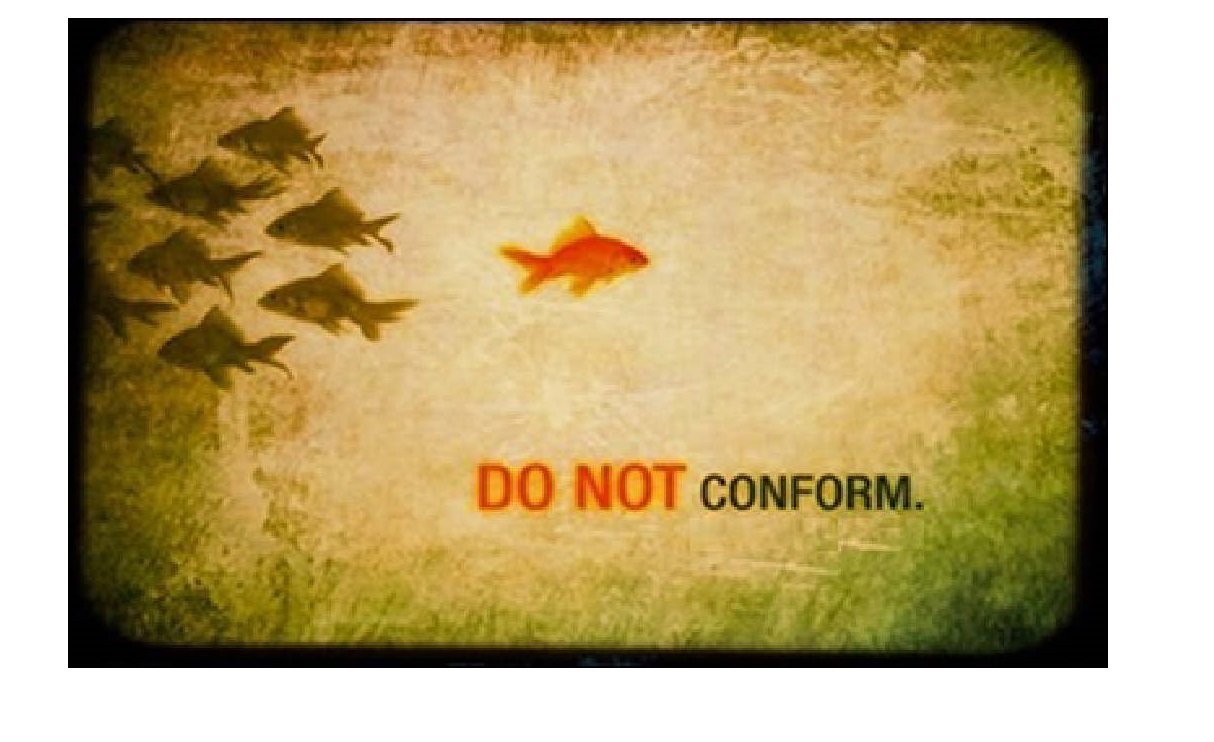
Getting out of our comfort zone:
“Do not conform to this world but renew your mind”
We tend to live in the ghetto of our comfort zone by conforming to outside expectations. We all have many forms of conformity: from staying up late for a TV show to following the same religious routine for years. Today we reflect on Paul’s recommendation not to conform to the world but renew our minds, in chapter 12 of his letter to the Romans.
By conforming to this world our lives become secularized in the long run. “What good does it to you to gain the world if you lose your soul?” When we conform to the world, we become like robots, living at a lower level of consciousness.
“Renew your mind and discern what is pleasing to God.” Our guide and model is Jesus Christ. We have to learn to live as he lived. For thirty years his life he was like that of all his neighbors. He conformed to outside expectations but with an inner determination. How can we achieve this?
Inner silence, prayer, and bible studies are a sure way. At times in his public life Jesus spent the whole night in prayer. For sure he had done it before. We should be able to find some time every day to recollect in prayer. Silence is necessary for inner life. When the radio or television are on most of the time, they capture our minds and prevent us from thinking on our own. It would be quite profitable not to turn on the radio in the car and keep television off much of our free time. It is in his times of silence that Jesus observed nature from which he created his parables.
Jesus was also an assiduous student of the bible. When given to read a passage from Isaiah in his native Nazareth, he could comment on it at once, having read it many times. He had probably memorized most of the bible, as is common in oral cultures. In Muslim countries today children still learn to read and write from their sacred books, as was the case in the West before universal education. Knowing the bible is a sure step towards renewing our mind after the model of Jesus.
“Discern what is pleasing to God.” Through the day we are confronted with many choices. Instead of deciding according to what is pleasing to us, we should opt for what is most loving to others. As Paul states in the next chapter, repeating Jesus’ teaching, “love your neighbor as yourself” because “love is the fulfilment of the law.” (13:10)
Next week we turn top the first letter to the Corinthians, and reflect on “the foolishness of God which is wiser than human wisdom.” (1 Cor 1:25)
July 12
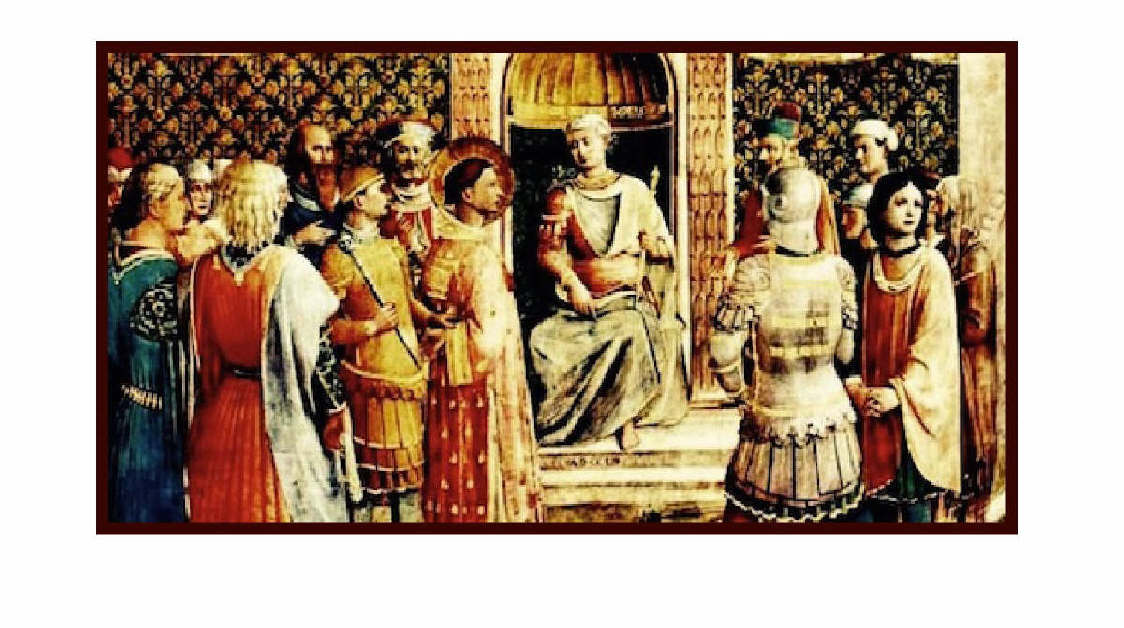
“Nothing will separate us from the love of Christ.”
Paul’s letters are difficult to absorb, for me like for everybody else. A good way to learn is to reflect in writing. This is what I am doing here.
Justification by faith is Paul’s central point in chapter 8 of his letter to the Romans. In order to understand it, let us begin with the more general statement, “The law of the spirit in Christ Jesus has freed us from the law of sin and death (8:2)” This assertion can easily be misunderstood. I will break it down into three different assertions.
1. “Christ Jesus has freed us from the law.” It is the common belief that salvation by faith alone requires no works. This is a common understanding that by accepting Jesus Christ as Lord and savior one is guaranteed eternal life no matter what. Even criminals can go to heaven by faith alone. For instance, if Stalin of Hitler had accepted Jesus Christ at their deathbed, they would have been saved like everybody else, independently of their crimes. This is a cheap understanding of both salvation and eternal life. If Nero and Stalin had been saved at their deathbed, you would find them next to you in a uniform heaven. Something is wrong here!
2. “Christ Jesus has freed us from the law of sin.” It is also a common belief that if you are saved by faith you will not sin anymore, at least not in important ways. We may commit little sins, yes; big sins, no. This view is a consequence of the previous one: salvation by faith requires no works, no good deeds by following rules and laws. But “where there is no law, there is no violation,” (4:15) as explained previously. We do not feel sinful when we are complacent about ourselves and do little to come closer to God. This was not Paul’s experience: “I do not do the good I want, but I do the evil I do not want” (7:19). It is only by trying to do good that I discover sin in myself: “I see in myself a principle that takes me captive to the law of sin that dwells in me” (7:24). Would this be salvation through good works? Not at all, as explained next.
3. “It is the spirit in Christ Jesus that has freed us from the law of sin and death.” Now the emphasis is on having the spirit of Christ. Paul’s argument is NOT 1. that we are freed from the law, or 2. that we are freed from sin, but rather that we must have the spirit of Christ. Paul adds three conditions to be freed from sin and death. We are freed from sin and death:
- “If Christ is in you.” (8:10)
- “If the Spirit of the one who raised Jesus dwells in you.” (8:11)
If we have the spirit of Christ Jesus, then we are freed from the law of sin—not because we sin no more but because we are forgiven. We are also freed from the law of death—not because we will not die but because we have hope in eternal life.
We are pleasing to God (or “justified”) not because of our good works—although we do many good deeds in comparison to Hitler or Stalin— but because the spirit in Christ Jesus in us is primarily a spirit of faith, and only secondarily a spirit of works. To live by faith in every single moment is ten times more difficult than to live with good works. It is more difficult to live by faith, hope, and self-giving at all time than by good works from time to time. We can live by faith and hope while working, eating, and even sleeping while we can do good works only occasionally. A life by faith, according to Paul, is a life full of hope and charity. It is a life in which “Nothing can separate us from the faith and love of Jesus Christ” in every single moment of the day and the night. This is what Paul means by having the spirit of Christ Jesus: a life of all three, faith, hope, and charity.
Next week we turn to chapter 12 and reflect on “Do not conform yourselves to this world but renew your mind” (12:2).
July 5

ON RACE:
“I beg you, brothers, that there be no division among you.”
This call to unity is particularly appropriate in our situation of national conflict about race, white supremacy, and police violence. This call to unity is not just a political issue; it lies at the heart of the Christian message which is one of universal reconciliation. We are to be a new creation, one in which we are all reconciled with God and reconciled with one another. In this new creation “There is neither Jew nor Gentile, neither slave nor free, nor is there male and female, for you are all one in Christ Jesus” (Gal. 3:28).
In the very first Christian community, which emerged after Pentecost, we see this new creation at work. “They had all things in common; they divided things to each according to one’s needs. They ate their meals with exultation and sincerity of heart.” (Acts 2:44-46). This ideal did not last very long. Only months later appeared the first racial conflict. The gentile Christians felt that their widows received less food assistance than the ethnic Jewish Christians, although both were Christian Jews. This racial and ethnic conflict continued to infest the first Christian communities until it exploded into a global confrontation at the Council of Jerusalem about 20 years later. Paul had to come to defend his position in front of apostles and elders who mostly favored the traditional conservative position. Paul himself will ultimately be on trial for his assumed anti-Jewish teachings and practices, charges which led to his death.
The church itself has been ripped apart by ethnic and racial divisions throughout the centuries. The East-West Schism of 1054 divided the church along ethnic and cultural differences about a different understanding of power in the church. The Reformation further split the West into North and South on the basis of the political power gained by Catholics and Protestants during the religious wars. In the US, the attitude towards slavery further divided many denominations into Northern and Southern branches. Within many Protestant and Catholic churches, there is the latent conflict between conservatives and liberals supporting opposite political parties. In reference to unity, Christians have not much to brag about.
Today more than ever we must listen to Paul: “I beg you, brothers, that there be no division among you.” Each time we say something derogatory about others, we tear apart the mantle of Christ. Each time we tattletale, joke, make fun, use irony, sarcasm, and other words of violence against people of a different race, gender identity, or religion, we promote a culture of exclusion and racism.
Next week we go back to the letter to the Romans. Read chapter 8. We will reflect on "Nothing will separate us from the love of Christ." (8:35)
June 28

“I do not do the good I want, but I do the evil I do not want.”
In chapter 7, Paul presents a very well-reasoned argument moving from common sense to sin and grace. Let us go over the various steps.
We all agree that “where there is no law, there is no violation” (4:15). A crime in one country is not a crime in another. There are many unfair business practices that are not illegal; so, they continue. Many advertisement claims are false but not illegal; so, we often fall for them. This is true for our own moral life: we make no difference between gossiping and lying; between joking and hurting people’s feelings; between cutting corners and cheating. When there is no clear-cut law, there is no violation, and we take advantage of it.
“I did not know sin except through the law” (7:7). It is through the Jewish law that Paul discovered his failings like jealousy, envy, hatred, etc. Moral rules are important not only because they tell us what to do, they also tell us when we fail; and the awareness of failures is necessary for improvement. We all know some people who never accept that they are wrong; so, they will never improve. Students cannot improve unless they are shown and accept their failures.
Today there are fewer accepted moral rules than in the past, so most people feel they are good persons. Yet we also know that “The demands of the law are written in our hearts” (2:15). Conscience is what tells us what to do, but if we do not listen, it becomes faint over time. We have to find moments of silence and pray that we may hear this inner voice. Most people at the end of life realize that they did many objectionable things. One has to listen at once to one’s conscience; to have regrets in old age is not enough.
“Sin worked through the good” (6:3). The more we try to become good and holy, the more we realize our failings and become aware of our deep sinfulness. This is why holy people are very modest about themselves; they would have good reasons to brag but they do not. The opposite is equally true: people who do not feel very sinful are probably quite complacent about themselves and do little to come closer to God.
The more we try, the more we encounter failures. “I do not do the good I want, but I do the evil I do not want” (7:19). Or more strongly, “I see in myself a principle that takes me captive to the law of sin that dwells in me” (7:24). This is a very depressing perspective! “Who will deliver me from this?” Paul has an immediate answer, “Thanks be to God through Jesus Christ our Lord.” (7:25). Jesus is the answer: “Where sin increases, grace overflows all the more.” (5:20) Now we can boast in our failures, because through them grace overflows even more. Thanks be to Gold through Jesus Christ!
June 21

“Abraham trusted in God and he was given credit for it.”
Paul illustrates justification by faith with the example of Abraham. God asked Abraham to leave his land, relatives, and his father’s house on the promise that he will become the ancestor of a great nation. We do not know on what basis he believed this promise, but he did.
Sometime later, the Lord repeated his promise in a vision, but Abraham replied, “You have given me no offspring, so a servant of my household will be my heir.” No, said the Lord, “Look at the sky and count the stars, if you can. Just so will your descendants be.” The number of stars in the sky proves nothing. Yet “Abraham put his trust in the Lord who gave him credit for it.”
When Abraham was 99 years old, God made a covenant with him. It included again the promise of many descendants but imposed circumcision on all males to be born in his household. Abraham doubted God, “How can a child be born to a man who is 100 years old?” Then God promised him a son to be called Isaac, but no date.
Near the oak of Mamre, three visitors came to enjoy Abraham’s hospitality. When leaving, they promised that one year hence Sarah will bear a son. Sarah laughed in distrust. Abraham’s faith was tested by his wife’s disbelief.
After the birth of Isaac, Sarah demanded that Ishmael and Hagar be expelled. They roamed in the wilderness with no more food and water. Then God interfered, and “God was with the boy as he grew up.” This is a strange story.
“Take you son, your only one, whom you love, and offer him as a burnt offering.” As father and son walked to the place of sacrifice, Isaac said, “Father, here are the fire and the wood, but where is the sheep for the burnt sacrifice.” To which Abraham replied, “My son, God will provide.” We know the rest.
This story is one of the greatest examples of trust in God. Abraham had accomplished many great deeds like interceding with God for Sodom and Gomorrah. Yet it is his unwavering trust, not his exceptional good works that brought him God’s favor. Trust in God is much harder but also more spiritually rewarding than good works. And one does not exclude the other; both are needed.
Read Abraham's tory (chapter 4). Could you read chapter 7 for net week? I will discuss, "I do not do the good I want, but I do the evil I do not want." (Rom 7:19)
June 14

Trust in God is more reliable than trust in self
What the Apostle Paul discuses in the first three chapters of his letter to the Romans is quite abstract. He states, “A person is justified by faith apart from good works.” (3:28) Here is a simpler way to put it: trust in God is ultimately more reliable than trust in self.
“All are pleasing to God (or justified) through the redemption of Christ Jesus.” We have heard this, many times. We agree at the abstract level, but in every life, we prefer to put our trust in ourselves. Here are examples.
Schools teach self-achievement because students should improve and master their talents. When grades are the only measurement of achievement, high grades come to be seen as the road to success. This system does not work very well because grades only measure academic ability, and high grades in one school may only be average level in another.
Hard work is the basis of the American dream. Romantic love is the beginning and the end of a good relationship. Careers in business and finances are a sure path to move up the social ladder. Status symbols in clothes, cars, and homes connect you the right people. Just trust yourself!
Shortsighted foolishness! Self-achievement and hard work are necessary, but so is trust in God. Before making any important decision, consult with the one “upstairs.” We should not pray for a good job or the ideal soul-mate, but we should pray for enlightenment and ask others for advice about work and relationships.
Trust in God is a daily practice. Every day when waking up, we should ask our Lord, “What do you want me to do today?” Just listen to your heart, and you will know. At the end of the day you may ask again, “How much did I trust and listen to God to achieve what I did?”
In the parable of the prodigal son, the older brother showed his trust in his good works. “For all these years I served you and never disobeyed your commandments. But you never gave me a kid to have fun with my friends.” He thought he deserved a reward for his good works. In times of crisis, many people say, “What did I do to God to get this? I deserve better!”
As St. Paul wrote, we are pleasing to God by trusting in his gifts rather than trusting that our good deeds deserve rewards. One is faith, hope, and love of God; the other is self-love and self-hope.
Read again chapters 1-3 , and for next week, read chapter 4.
June 7
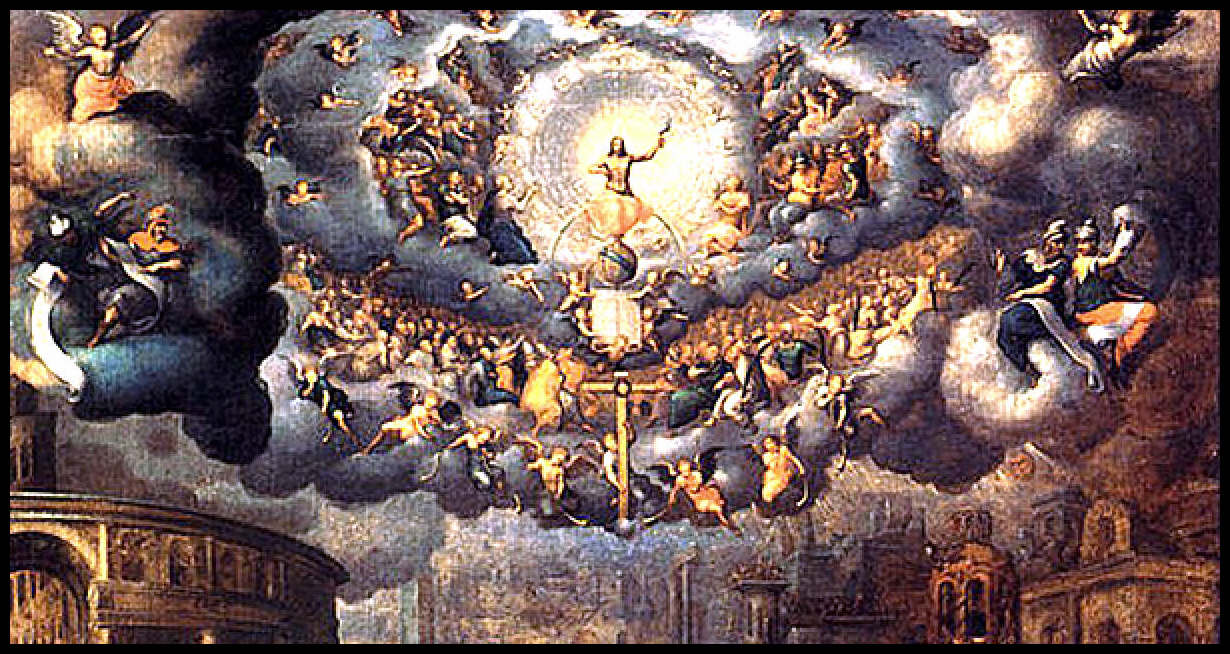
ESCHATOLOGICAL TIMES
We now live in end times or eschatological times which is the last cycle of the liturgical year. The first cycle is that of Advent leading to Christmas, the second that of Lent preparing from Easter, then come the fifty days of preparation for Pentecost Day, and finally, the eschatological times which span from the Pentecost Day to the Advent on November 29, 2020.
End times are also the end of all times when Christ will return in Glory. We do not know when this will happen, but it will take place for each of us at death. In the meanwhile, end times are part of the liturgical cycle.
During Advent, Lent, and the preparation for Pentecost we are in training. In eschatological times we must engage in the spiritual struggle on our own. This is the time to have a program of reflection and action. I propose to study St. Paul’s letters, beginning with that to the Romans. Here are some reflections for Romans 1-3.
The mere enjoyment of life is ultimately unfulfilling
The letter to the Romans begins with the wrath of God against both the gentiles and the Jews for having failed to glorify God. His language of fire and brimstone does not move us anymore because it is based on fear. The same can be said in less negative terms. I would summarize the first three chapters as "life without God is incomplete because without him there is no real fulfillment."
What is the purpose of life? For most people it is simply self-fulfillment and enjoyment. What do we seek in work? Economic and social satisfaction. What do we expect in marriage? Love-satisfaction, a cozy home, and beautiful children. What do we seek on weekends and vacation? Having fun. What would you like to do during retirement? Travel the world and enjoy the end of life.
This is short-sighted. For most people work is seldom really satisfactory because it is difficult to find exactly what we like; and there are layoffs, career changes, and unfair business practices. Self-love in marriage is an unstable proposition: many marriages fall apart, and some of those that survive may be acrimonious at times. Children may cause grief and may not fulfill the parents’ expectations. Health is problematic: our sedentary way of life leads to overweight, heart attacks, and a lower life expectancy; we are defenseless against new viruses for which there is no vaccine. Enjoyment in retirement? Yes, if you have the nest egg for it. At the end of life, we are confronted with the question: what did I accomplish? What do I leave behind? Nothing? How sad!
Vanity of vanity, the mere enjoyment of life is vanity! All cultures throughout the centuries have made wisdom the ultimate goal of life. It is so in the bible, especially in the Book of Wisdom. The ultimate wisdom is to find God, that is, Jesus Christ. Finding God is Paul’s next argument.
Read chapter 1-3, and for next week chapter 3.
May 31: Pentecost

“All heard the apostles speak in their own languages”
The apostles and the women among them “began to speak in different tongues, as the Spirit enabled them to proclaim.” Obviously, they had something different to say; they were parroting one another. Yet among the listeners were people from many cultures and civilizations (Romans, Greeks, Mesopotamians, Arabs, Africans, Jews, etc.) and “all heard the apostles speak in their own languages.” We know what Peter said, but not what Thomas or Mary the mother of Jesus said. If they were all speaking at the same time, how could everyone hear all of them in his/her own language?
The miracle of the Pentecost is the story of Babel in reverse. The origin of all cultures can be explained by the breaking up of the original Hebrew language into many languages and customs, but in the biblical vision, these many cultures have produced universal idolatry and sin. Pentecost is the return to a universal language—not Hebrew, Greek, Latin, or English—but the language of the Spirit which speaks in many languages. After the witnesses of the Pentecost returned home to Rome, Mesopotamia or Africa, they said many things but all in one spirit. Pentecost is the miracle of unity in diversity.
The Pentecost did not bring uniformity, but this is what we have: diversity of churches with quite some uniformity within each one, and this can be seen as a betrayal. “That they be one” prayed Jesus, one in spirit, not one in uniformity. Pentecost is the day to celebrate church-wide diversity, between Jews and Arabs, Blacks and whites, Protestants and Catholics, Lutherans and Calvinists, mainline and evangelicals. How do we speak about other churches? From our sense of superiority? Many churches may have more spiritual fire than our own. Are we ready to knowledge it?
In the many churches in Rome, Mesopotamia, or Africa (and today in the whole world), believers have developed new doctrines and new rituals, some of which were quite deviant. Hence it is always necessary to come back to the main source of Christianity, scripture. But scripture needs to be interpreted. What comes first, scripture or the interpretation? The problem is real, but it is not my concern here.
How often do you read scripture? There is need for a reading plan. One can usefully reflect on the Sunday readings but a more systematic study is also helpful. In the weeks to come, I will meditate on the Letter to the Romans, not every chapter and verse, but only those that inspire me, as one needs personal inspiration to write about something.
Could you read Romans 1-3? I will summarizes it as: The mere enjoyment of life is unfulfilling.
May 24: Sixth Sunday of Easter
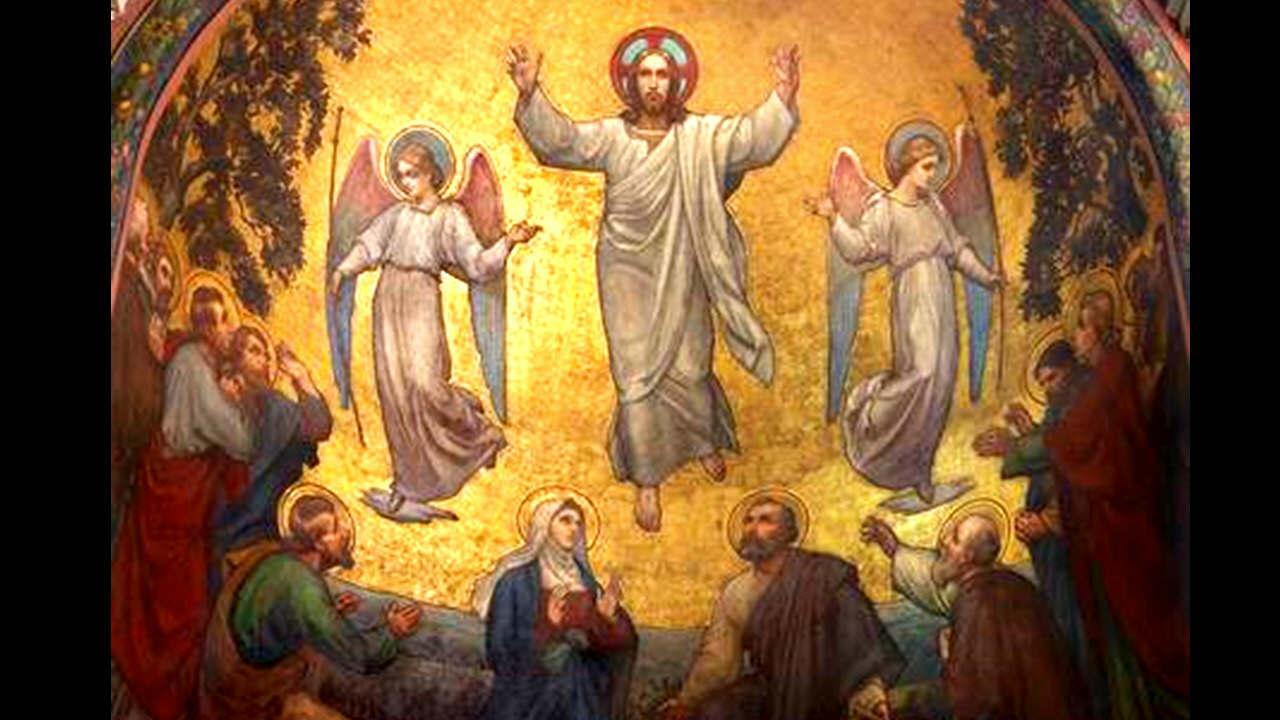
"Why do you keep looking at the sky?
Jesus will return."
The Ascension of our Lord is the perfect setting for the parable to the talents. Here is the story. Before going on a distant journey, a noble man called his servants and gave them sums of money, to each according to his ability. “Trade and make it grow while I am away,” he told them. Jesus went on a distant journey. When we will come back, he will ask us what we have done with his gifts.
Basic gifts of nature are memory, intelligence and will. We have to develop them, not only through formal education but by learning throughout life. Each time we learn a new skill, a new technique, a new theory, each time we read a book we become more able to serve others and ourselves. We are given a healthy body. We must keep it in good shape through the medicine of healthy food and regular exercise. Once we let our health slip away, we are of little help to others and ourselves. The pandemic is a good time to expand our knowledge and exercise our bodies.
Spirituality is a practice, not just attending church. It requires discipline like learning, work, and physical exercise. Ideally, we should have some devotional time set up in the morning, the evening, or before falling asleep. It can be as varied as reading the bible on the cellphone or listening to music or a tape in the car. There is nothing worse for the spirit than being overworked. Prayer and meditation cleanse the spirit the way a good night’s sleep refreshes the mind.
We are given a family and friends. These networks are a precious gift that needs to be cultivated. People who retreat into self and neglect friendships often become lonely, depressed, and unhealthy. We should ask ourselves, “What can I do for so-and-so?” or “which contact have I neglected that needs to be re-activated?” This also applies to church members and professional organizations. The body of Christ consists of all people of good will who all need our support.
Let us not forget the poor. If we give tips of 10 to 15% in restaurants, we should be more generous than the paltry 1 or 2% most Christians give to church and charities. When on a tight budget we should aim for 4 or 5%, and if enjoying a comfortable income, we could aim for the traditional 10%. “Kindness to the poor is a loan to the Lord, and He will repay the lender.” (Proverb 19:17)
The Lord is coming back. Let us welcome him with the many talents which we have multiplied for his kingdom.
May 5: Fifth Sunday of Easter

Confronting Peter’s leadership:
complaints of liberals about conservatives
In the very first days of the church, “The Hellenists complained against the Hebrews because their widows were being neglected in the daily distribution.” The Hellenists were the future of the church, the first of the millions of converts, while the Hebrews were the Jewish Christians who had seen the fulfillment of scripture with the coming of the Messiah. At the beginning the Hellenists were a tiny minority, but as the number of believers was increasing daily, the church structure needed to change. The old-timers wanted none of it.
This is the situation today and throughout history: new circumstances—like the coronavirus—require changes, but the old-timers resist. The conflict was resolved admirably: “The Twelve called together the community of the disciples and said, ‘It is not right for us to neglect the word of God to serve at table. Brothers, select from among you seven reputable men, filled with the Spirit and wisdom.'” The proposal was accepted, and the selected seven men all had Greek names: they were Hellenists. The selection was accepted by the whole community, that is, by the Hebrews. What an example for us! The liberals complain and the conservatives resist. Then the Twelve—not just Peter—call for a meeting. The liberals make a proposal and the conservatives accept it. Finally, the Twelve officially approve the solution. This is definitely a model of synodality to follow at all levels.
The conservatives usually stand for tradition, at its best and at its worst. The liberals want change, often for the better and often also for the worst. Both need to be considered. The conservatives must remind all believers that the God of Israel is the God three times Holy, slow to anger and rich in mercy, who wants the conversion not the punishment of sinners. Liberals must point out that the language of most people in the churches is not Latin but… English. The conservatives must help preserve the beauty of Gregorian chant but the liberals must adjust the music to the age of jazz and rock-and-roll. The churches stand at a historic moment of mutual complaints of liberals and conservatives about problems that will not go away unless squarely confronted. Among them I could list: clericalism in all churches, sex scandals in many, poor preaching only too often, perfunctory and uninspiring Sunday liturgies, the priesthood of the laity which includes the priesthood of women, a sexual morality inspired by the highest biblical standards but adapted to our times, churches that are communities rater than Sunday meetings, parishes and congregations that are engaged in the world, biblical studies in classes and small groups; finally, following today’s example, regular synodal meetings where conflicts and disagreements are aired and resolutions sought through compromise. Is this a complainer’s list? If so, let conservatives help find a mutually accepted solution, in synodality.
May 3rd: Fourth Sunday of Easter
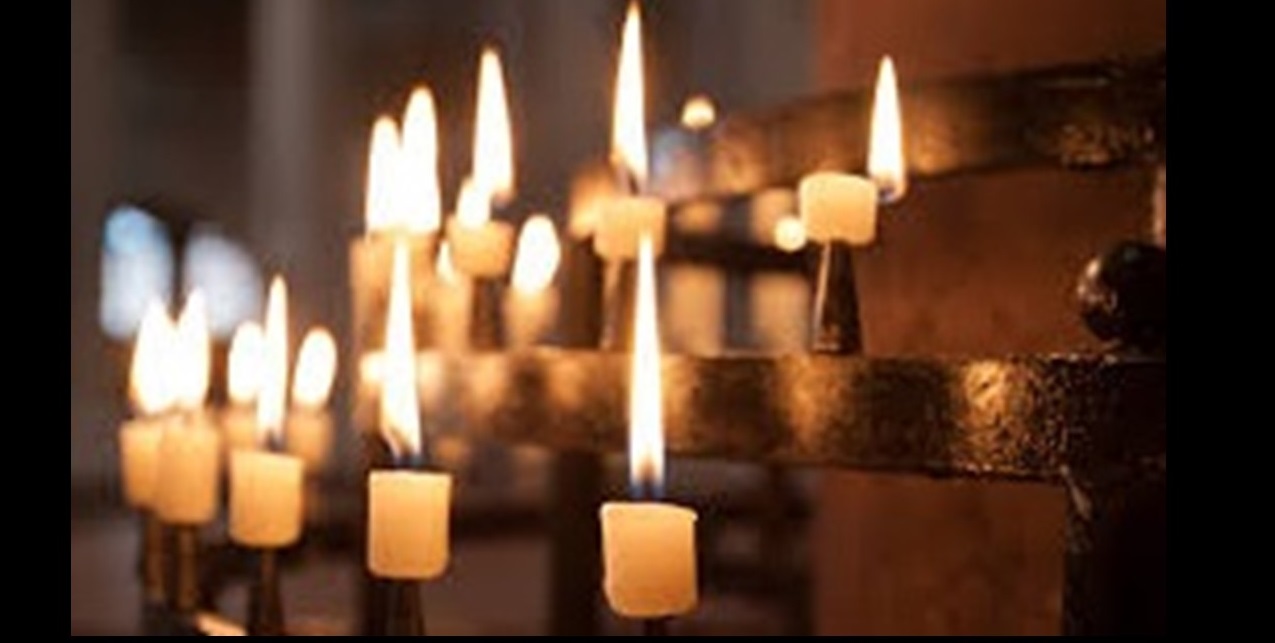
From Peter: You who had no goal,
the resurrection of Christ is your hope
It is not gold and silver, says Peter, not money, career and success, that will fulfill our goal in life. In these pandemic times, people with money can’t buy anything, and those without can only hope, not just for money but rather for the end of the pandemic.
Jesus is the Way, the Truth, and Life. “If you had been here, my brother Lazarus would not have died.” To which Jesus replied, “I am the resurrection and the life. The one who believes in me will live, even though they die. Do you believe this?” Belief in eternal life is one thing, but hope today is another, and hope is what we need. The resurrection of Christ is our hope today, in our times of trial. It is not the promise that things will turn out the way we wish, it is the certainty that God will not deceive us.
This is what the resurrection means: “I am with you until the end of time.” Jesus is the Emmanuel, God-with-us. If God is with us, who can be against us? But his companionship is invisible: we must work at it. Many people believe in guardian angels; Jesus is more than our guardian angel. He is the Way: the guide to believe in, the model to emulate, the teacher to listen to.
One way to keep the spirit of hope alive is through reading. There re so many good books available, yet we may spend so little time reading. One easy way is to have a daily reading, for instance through an App that downloads a short reading every day. Reading is more than information: it is also a form of meditation, a rumination of what we have read.
Silence is the best way to hear; noise and activism dull the mind and the ear. We all have silence at night before going to sleep. It is the time to review the day, what worked and what failed. It is a good time for personal prayer and reflection. That my be our only time of companionship with the risen Christ, God-with-us.
Most inspiring for many people is music because sounds create a mood that can last for hours. Starting the day with uplifting music will create a mood of hope for the day. A well-known song of companionship is “ The Lord is my Shepherd.” Let us listen to it.
April 26: Third Sunday of Easter

Christ the teacher
This beautiful mosaic illustrates Christ’s teaching power. He is the the alpha and omega, the all-powerful creator (pantocrator); through his creative and saving word he brings together the whole creation.
In today’s reading, on the way to Emmaus Jesus told his disciples:
I wish Jesus were here to show us, step by step, how it was necessary that the Christ suffer and be raised from the dead. Actually, in most of the Jewish scriptures it is not stated that the Messiah would suffer; in fact, starting with Moses and most of the prophets, the idea of a coming Messiah was rather nebulous. Moreover, the general expectation was that the Messiah would be a successful social leader like Moses and a military conqueror like David. As to the resurrection, nowhere is there a mention that the Messiah would come back from the dead—an unimaginable and contradictory perspective.
Totally different is the question, “Was it not necessary that the Christ suffer?” What do you think? One must be really familiar with scripture to see that “it was necessary”—it was in the logic of the history of the Israel. The Jews already had a new Moses and new David in the Maccabees who rebelled against foreign power, re-conquered the Jewish land and created the Maccabean dynasty. By the time of Jesus, however, the Jewish state was a corrupt as it had always been. Hence “it was necessary” that God’s glory be shown through humility rather than military glory, and the power over death rather than power to inflict death. “It was necessary” to come to a different understanding of God: as self-giving love rather than a supernatural force that imposes itself.
The disciples did not get it by themselves, Jesus had to explain it to them. In last week’s reading, Thomas still did not get it and Jesus came back just for him, and say, “happy are those who believe without seeing.” The majority of the disciples still did not get it since they retreated in the cenacle. They needed the jolt of the Pentecost to speak up and explain that “It was necessary that the Christ should suffer.” But from then on, the followers of Christ were expected to read and reflect on scripture: everyone has to discover individually through prayer and reflection that “it was necessary” that God’s love came through humility and not world power.
Throughout history there have been jolts of the Holy Spirit but more generally Christians have to pray and study to discover the ways of God’s love. What do you do? Do you read scripture assiduously? No magic can infuse in you the knowledge of relativity or quantum mechanics: you must study! Do not expect the magic of the Holy Spirit to infuse you with the understanding of scripture: you must pray and study.
Christ is a great teacher; his word speaks to the heart and gives peace and joy. The confinement of the pandemic gives us time: let's pray and study.
April 19: Second Sunday of Easter
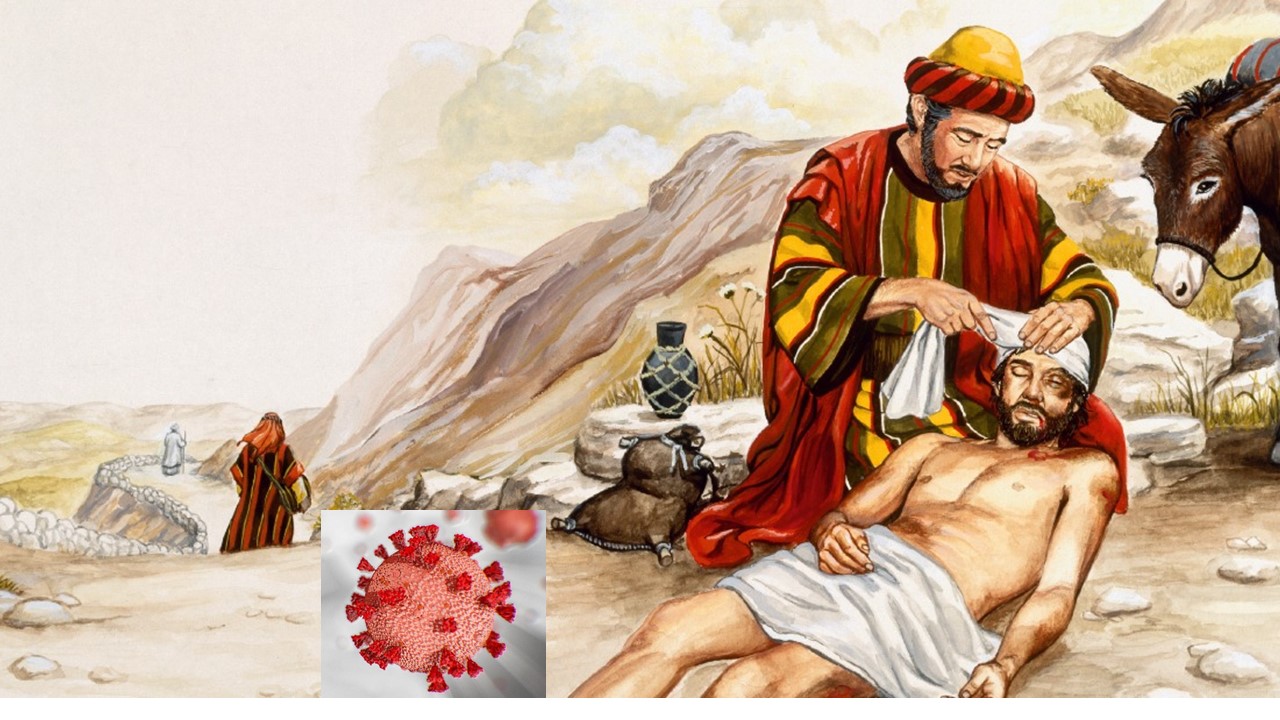
Two pandemics in early Christianity
In 165 an epidemic swept through the Roman Empire. Mortality was so high that in many places one could see caravans of carts hauling the dead from the cities. Maybe 20 to 30 percent the population died. Another pandemic struck about hundred years later, equally devastating: 5,000 people died daily in Rome at the height of the epidemic.
In those days, there were so social services for the sick and the dying, no hospitals, no nurses, no family doctors. On the contrary, anybody who could run, fled to the country side, abandoning the sick, family members and slaves. By contrast, the Christians had organized social services for the widows, the poor, and the sick; in front of the epidemic, they stood the ground, ministering their sick members and pagan neighbors. Then as today, not everyone is affected equally, and many can be saved through simple care. “When all normal services break down, quite elementary nursing will greatly reduce mortality,” according to experts. Just comfort food and nourishing drinks, moral support, and basic hygiene can save lives, instead of abandoning the sick for fear of contagion. Miracle! Many Christians survived and the pagans noticed it. After each of these pandemics there was an upsurge of conversions.
People often say, “The church is rich!” Hopefully they are rich in resources for social services. Food pantries and soup kitchens are organized by churches, not city halls. Do you know any government that hands out food stamps to all those who need them? No! the single mothers, children of single mothers, and orphans are not well treated by our legislators acting in our names. Is the economy more important that the welfare of the people?
Today in the Acts of the Apostles, we read:
they would sell their property and possessions
and divide them among all according to each one’s need.
Every day they devoted themselves to meeting together in the temple area
and to breaking bread in their homes.
“To each according to one’s needs” was the motto of the first Christians. This is particularly true in an epidemic when the weak need special care and attention. This is also true in the civil society today: the U.S. has become one of the most unequal societies in the West. It is time to put Christian principles at work in our political programs.
And “Every day [let us] devoted [ourselves] to meeting together in prayer and to breaking bread in [our] homes.” This is the peace of Easter.
April 12: Easter Sunday
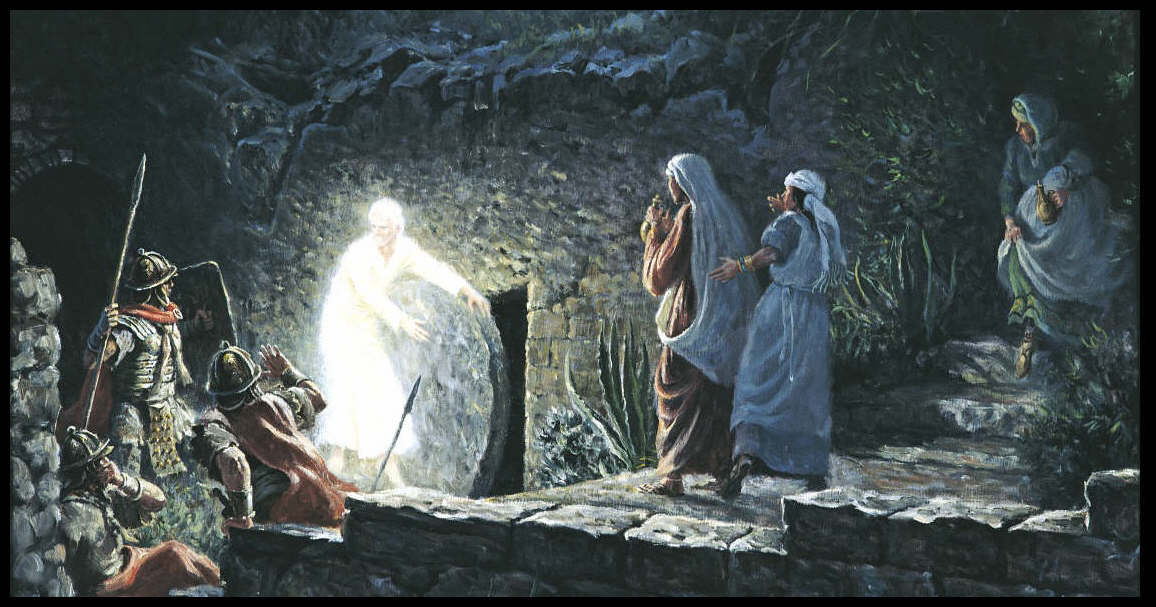
The empty tomb proves nothing
A few women claimed to have seen an angel. This is the worst kind of testimony: in the Ancient World women could not even testify in court. On Pentecost day, some of the group spoke in tongues—as if they were drunk. The resurrection cannot be proven. It is a matter of faith.
Would I shed my life to testify to the risen Lord? I have no vocation to be a martyr, and I hate pain in all its forms. I would rather run than face the challenge. But there are some who do. The apostles testified at the price of their lives; so did many first Christians.
To testify out of conviction is admirable. We all admire the health workers who risk their lives to help the victims of the corona virus, and I am sure they have no vocation to be martyrs; they may even work with deep fears. So, I am also ready to testify, but at a safe distance.
To believe in the resurrection gives meaning to life; to believe in the coming kingdom of Jesus Christ is a cause worth fighting for, like fighting the corona virus until it is eradicated.
Through his death, Jesus has overcome hatred. This is more than a pious statement. In his passion he was the silent victim of all the viciousness humans are capable of: the betrayal of a friend, the arrest with clubs and swords like that of a bandit, the coward running away of his disciples, the seeking of false witnesses by the highest Jewish court, the denial of Peter, the insults and blows at the Sanhedrin, the releasing of insurrectionist Barabbas rather than of the prince of peace, the scourging without condemnation, the weakness of the governor to confront injustice, the scarlet robe of humiliation, the crown of thorn in mockery, the travesty of a reed in his right hand, the inhuman cruelty of crucifixion, the inhumanity of the passer-by towards atrocious suffering… all this, as willing victim, while God could have sent a legion of angels to annihilate the oppressors.
By not responding to hatred with hatred, we destroy its power. By not annihilating hatred, God has destroyed its power because we have learned to do the same. By resuscitating the one killed by hatred, God has destroyed the power of the fear of death.
On Easter morning, God has destroyed the power of both hatred and death. ALLELUIA!
April 5: Lent 6.
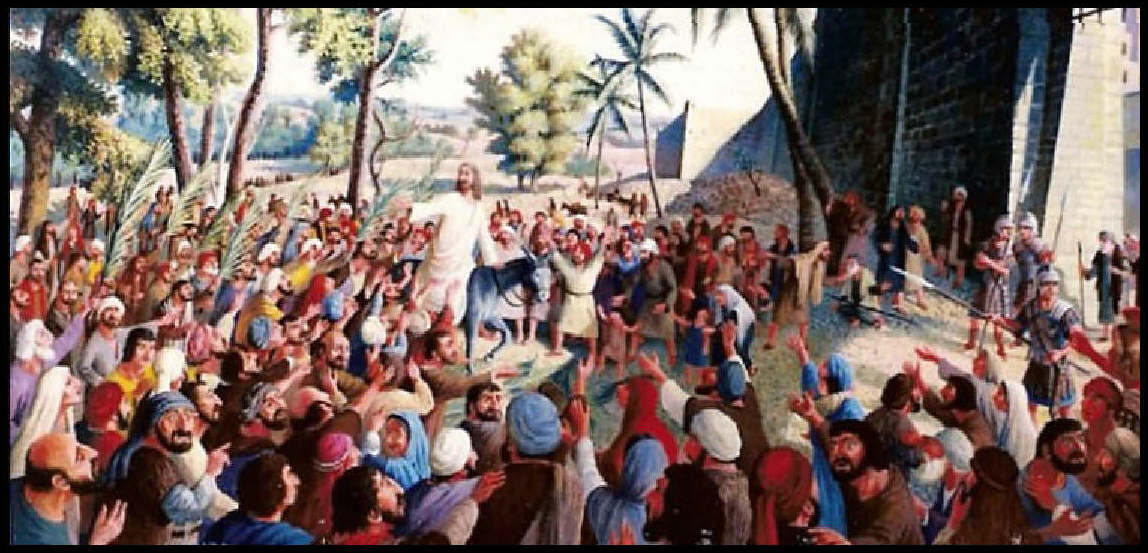
"Behold, your king is coming to you,
humble and riding a donkey."
This is Zachariah’s vision about the coming Messiah, which is appropriately applied to Jesus entering into Jerusalem, celebrated today on this Palm Sunday. Here are Zachariah’s words: “Exult, O daughter Zion! Shout of joy, O daughter Jerusalem! Behold, your king is coming to you…” Today on Palm Sunday and Passion Sunday we are also entering the cycle of the Jesus’ death and resurrection.
Jesus came as a servant. “Because he was in the form of God, he emptied himself, taking the form of a servant, coming in human likeness.” In the continuous creation and expansion of the universe, God empties himself without ever losing anything, but always expanding divinity to the end of infinity. As the psalmist wrote, “The heavens declare the glory of God; the skies proclaim the work of his hands.” Because God is inexhaustible love, he can inexhaustibly empty himself.
God emptied himself to become a servant among his people. “Here is my servant whom I uphold, my chosen one with whom I am pleased. Upon him I have put my spirit.” This is the way Isaiah envisioned the coming Messiah. “This is my beloved Son” said the divine voice about Jesus on the Mount of the Transfiguration. This is the humble servant riding on a donkey entering Jerusalem. This is the Jesus among his people as represented in the above painting.
“I gave my back to those who beat me, my cheeks to those who tore out my beard. My face I did not hide from insults and spitting—because the Lord God is my help.” Again, these are the words of Isaiah, and these words apply to Jesus. As we are entering the Holy Week, we are reminded of the main image of our faith, the crucifix that is found in all churches and on all altars, and in many homes. Yet death is not the end, but rather a new beginning. Nature and life have seasons; after the winter there always comes spring, a new beginning.
In these unpleasant times of home confinement for all, and sickness and death for too many of us, we may say with Isaiah at the end of his poem on the suffering servant, “The Lord is my help; therefore, I am not disgraced. See, the Lord is my help; who will declare me guilty?” We all know the beginning of the psalm “My God, my God, why have you abandoned me?” but it ends with hope and praise: “In the assembly I will praise you: You who fear the Lord, give praise! For he did not turn away from me, but heard me when I cried out.” Even in the hard times of our pandemic we may chant, “the heaven and the earth are full of your glory!”
March 29: Lent 5.
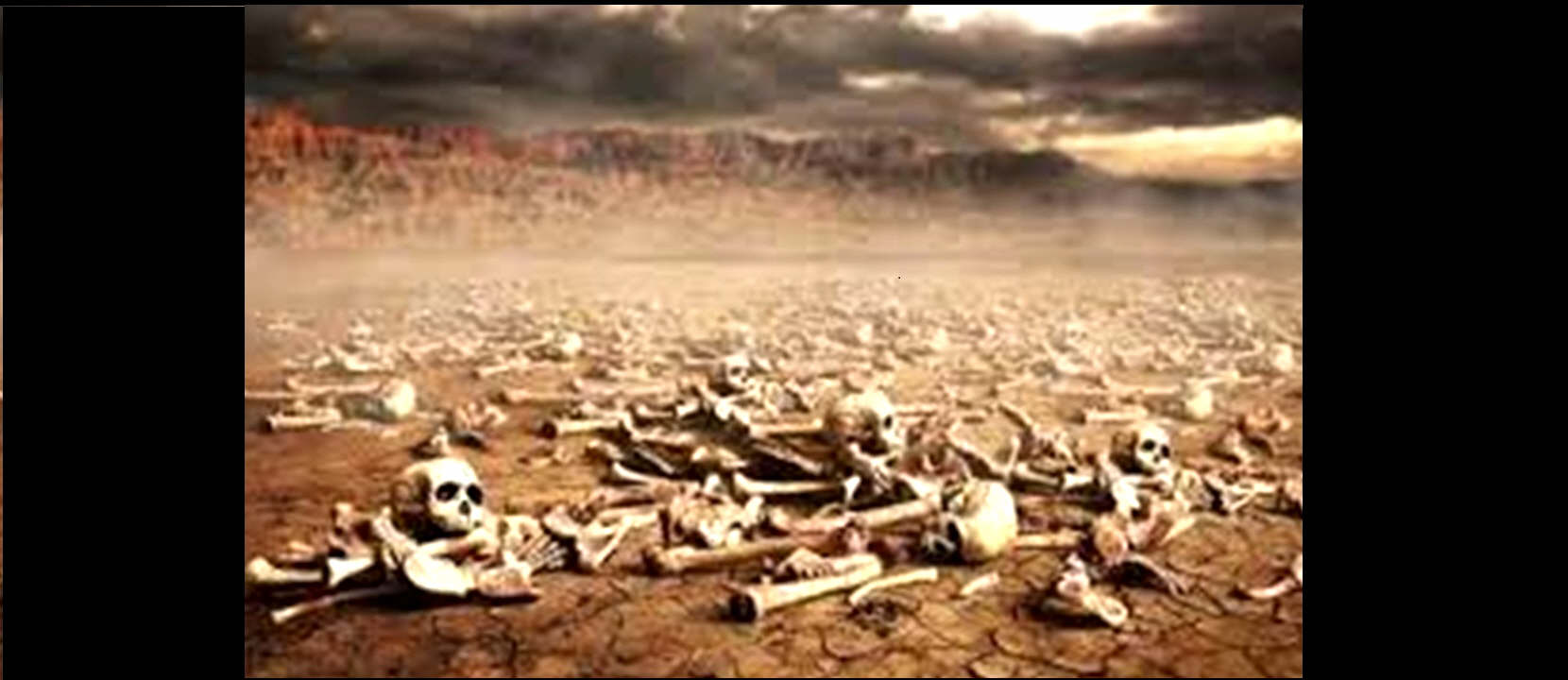
"O my people, I will open your graves
and have you rise from them."
This proclamation of Ezekiel from today’s readings is most encouraging in our somber pandemic times. It follows the prophecy over the dry bones regaining life as an image of the people of Israel coming back from its exile in Babylon.
This is not the promise that when we are sick and dying, we will come back to life, like Lazarus in today’s reading. Like Martha we may say, “I know [we] will rise, in the resurrection of the last day.” Most people expect some life after death but we must have higher expectations. Do we really believe that Jesus is “the resurrection and the life?” And “whoever believes in him, will never die?”
Most religions believe in some form of eternal life and that people’s soul goes to heaven, but there is much more here. When Jesus came back on Easter Sunday, he did not come as a departed soul having left his body in the grave. No. He came back with his body transfigured into a new reality, like what the apostles saw on the mountain of the Transfiguration, with Moses and Elijah conversing with him—this is not what ghosts do.
The resurrected Jesus is the first-born of the new creation to which we are all called to belong. “O my people, I will open your graves and have you rise from them;” this will happen on the day of the new creation. The universe is in a state of evolution, not just from its beginning but also towards its final end.
“We know that all creation is groaning in labor pains until now; and not only that, but we ourselves, who have the firstfruits of the Spirit, we also groan as we wait for the redemption of our bodies.” (Rom. 8:22-23). The whole creation in groaning in labor pains in the endless expansion of the universe since the Big Bang. But that’s not all. We are all groaning for the redemption of our physical bodies, either at death or at the ultimate Big Bag at the end of time. This is what the Spirit in us makes us hope and believe.
You may like to watch the video “The History of Earth - How Our Planet Formed” from National Geographic. This video clearly shows the violence of star and planet formation and the evolution towards humankind. This evolution was not random. The video begins with the prophetic words, “The earth is the only home to life in the universe.” The universe was created for us, and we are created for the New Creation. If we believe that, then have hope and thanksgiving. Yes, the Lord “will open your graves and have us rise from them.” Thanks be to Gold!
March 22: Lent 4.
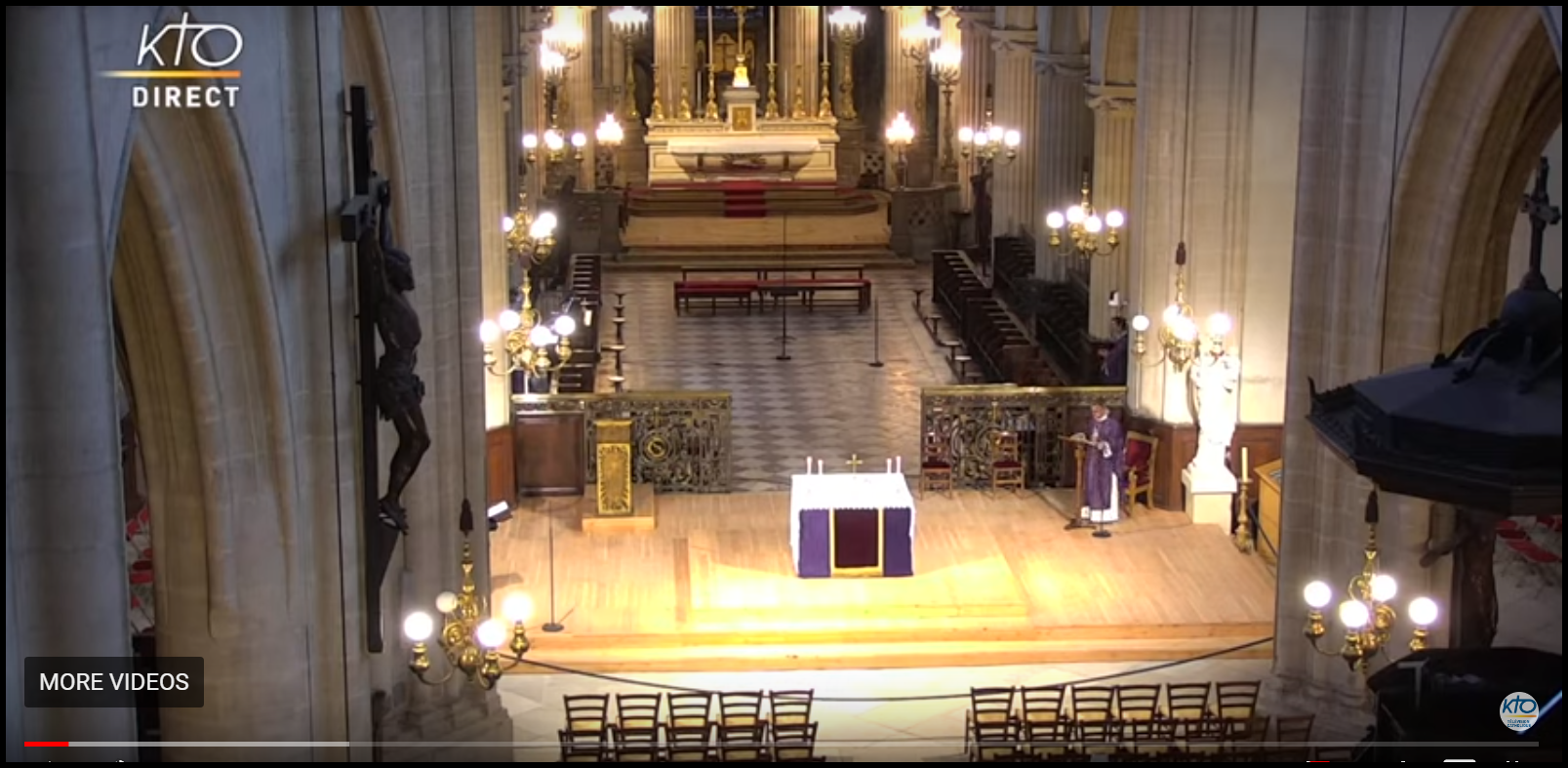
Empty-church service for coronavirus week 1
In Italy, France, and Spain people are confined to their homes except for food and health needs. Work and transportation are suspended except for basic necessities. Yet there are church services via television or YouTube. Here is a service on the French television KTO.
“Our church is empty. But with all the people following us on radio and television, our church would be too small to accommodate all of you. I know from the messages you sent me how difficult it is to stay home day and night, having nothing to do but to wait. Maybe this is an opportunity to make time for silence, to sit down and listen to God’s voice. The silence of our inner cells is inhabited by God’s presence. Then we may pray, ‘Yes, I call on you, Lord, because you can answer me. Turn your ear to me and hear my prayer.’” Listen to the continuation of this Psalm 17:
Hide me in the shadow of your wings.
At the beginning of most services there is a confession of sins:
that I have greatly sinned in my thoughts and in my words,
through my fault, through my most grievous fault.
Here is a modern prayer of repentance which comes with inspiring singing:
my wanderings, all my mistakes down
The gospel reading for this Sunday is the story of man born blind. There are many translations; here is one. It is the strange story of a man who is healed by Jesus whom he does not see, and when cured, he meets Jesus but does not recognize him. This is a common story: we walk blindly through life, and when occasionally cured, we do not recognize the Creator who cured us.
In this time of confinement, we are like like blind people wandering from room to room, unhappy and complaining. Would you rather be confined to a hospital? Then we must give thanks for the few little comforts we have and sing with Psalm 117
For his steadfast love endures forever.
This psalm comes with soft music. Soft music is a balm for the soul. In the cells of our homes, let us listen to the soft music of God's inner voice.
March 15: Lent 3.

Jesus is the living water for eternal life
To the Samaritan woman Jesus promised, “The water that I will give will become in them a spring of water gushing up to eternal life.” Jesus is the living water. He is the bread of life. He is the life of the world.
Like the Samaritan woman we may ask, “Give me this water, so that I may never thirst again!” She left the scene, and the discussion was left unfinished. Like this woman we must come to the well of eternal life to seek and drink its living water. This requires effort and regular practice.
In the winter when the ocean is frozen the seals maintain breathing holes where they come back to breath; they are mammals and cannot survive under water except for a few minutes. We similarly need breathing holes where we regularly return to find inner strength; we cannot survive very long by merely reacting to the demands of the moment like zombies. What are your breathing holes?
“When you pray, go away by yourself, shut the door behind you, and pray to your Father in private.” We may not have a special quiet place where we can retreat and reflect, but we can always withdraw within. The most difficult is not to withdraw from the crowd but to quiet down the thousand thoughts that roam through the mind. It is when we are alone that our repressed preoccupations surface again and demand our attention. This is why many people are afraid of silence and solitude, because they are either bored, lonely, or anxious.
When alone to reflect, it is useful to fix our attention on a text or a topic. Reading the bible, especially the New Testament fixes our attention and opens us to the universe of revelation. Children may like to read the stories of Joseph and his brothers, of Moses, or David, but we spiritual adults must select more advanced readings. The letters of Paul are difficult, but the four gospels are easy reading and easy to meditate on.
“Give me this water, so that I may never thirst again!” The prayer “Gimme, gimme what I want” is a child’s prayer; we spiritual adults must come to the well and seek spiritual refreshment. Like the women at Jesus’ time who came to draw water every day, we must come to the well everyday in prayer and bible reading, for Jesus is the living water. He is the bread of life. He is the life of the world.
The "Our Father" is a common prayer. Listen to it and prayer along!
March 8: Lent 2.
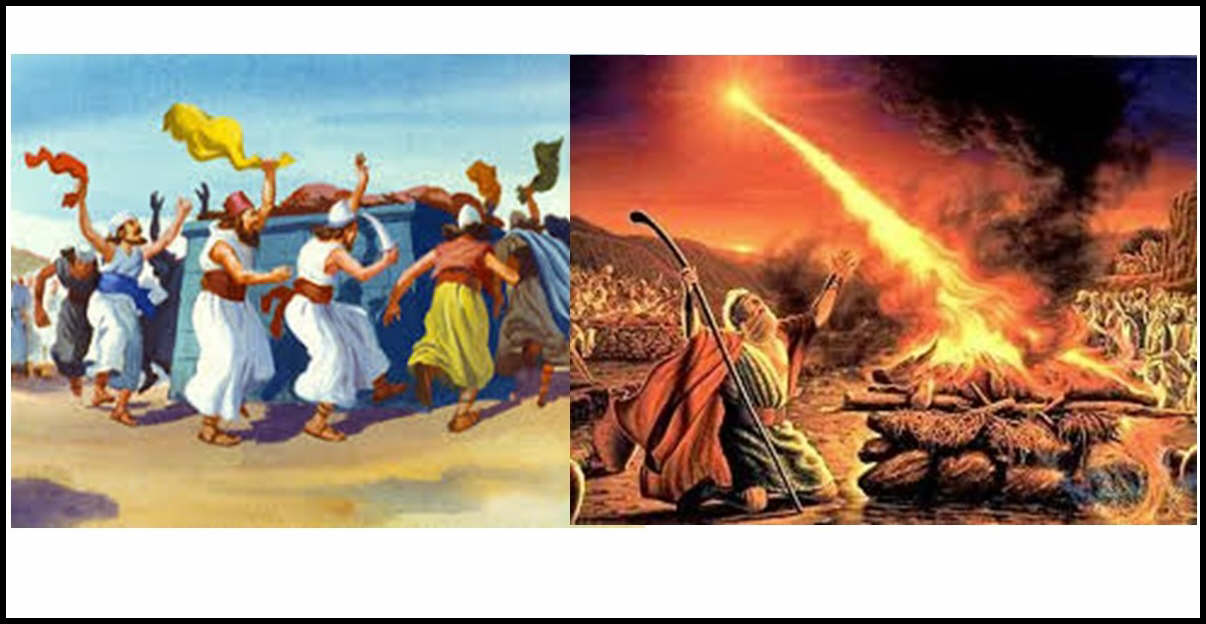
"When praying, do not babble like pagans."
Remember the story of Elijah and the false prophets: the priests of Baal shouted and danced from morning to noon, then shouted louder and slashed themselves until the end of the day, but no answer came from Baal. Elijah only said a short prayer and the fire descended on the altar of the God of Israel. No need to shout or babble in prayer: God is not deaf.
Here is a simple advice for praying without babbling, “Have no anxiety at all, but in everything, by prayer and petition, with thanksgiving, make your requests known to God. Then the peace of God that surpasses all understanding will guard your hearts and minds in Christ Jesus.” This is beautiful but often unrealistic because when we have anxiety up to our ears we are in no mood for thanksgiving.
“Out of the depths I call to you, Lord; Lord, hear my cry!” The image of calling out of the depths recalls the plight of Jeremiah in the muddy cistern. After he spoke out against an ill-advised war, he was arrested and thrown into a cistern. “They let him down by a rope; there was no water in the cistern, only mud, and Jeremiah sank down into the mud.” There is was be left to die. The image of sinking into the mud with no prospect of being taken out has inspired many prayers.
“How long, Lord? Will you utterly forget me? How long will you hide your face from me? How long must I carry sorrow in my soul, grief in my heart day after day? How long will my enemy triumph over me? (Ps. 13). How long? How long? We may continue for a long time our prayer of complaint. But how long shall we complain? Complaining helps bear the pain, and we know it; so, we complain to friends and relatives until they get tired of listening. But the Lord of mercy does not tire of listening. “Like the eyes of servants on the hand of their masters, so our eyes are on the Lord our God, until he shows us mercy." (Ps. 132). Like a friend complaining to a friend, we can complain to the Lord until glimmers of hope brings us some of that godly peace that surpasses all understanding.
In the process of longing for God like a deer longs for streams of water, we may move from gloom to hope and say to our selves, "Why are you downcast, my soul; why do you groan within me? Wait for God, for I shall again praise him, my savior and my God." You have recognized the words of Psalm 42. Sing along, "As the deer longs for streams of water, so my soul longs for you, O God."
March 1: Lent 1.

Satan: "I’ll give you the whole world
if you adore me."
This is the story of Dr. Faust who sold his soul to the devil for knowledge and pleasure. But it is the story of many people who pursue power and wealth at the price of losing themselves.
“I’ll give you the whole world.” Who owns the world? These are fake promises; this is outright lying. The devil has been a liar from the beginning. “Did God really say, ‘You shall not eat from any of the trees of the garden?’” Did Gold really say that? These are words to sow confusion. “You certainly will not die!” Be certain: believe me! The first step is to instill doubts about whom to believe then comes a promise: “You will be like gods!” Now that’s something we like to hear: an enchanting promise—without guarantees. “The woman saw that the tree was good and pleasing, and desirable for gaining wisdom.” All promises seem good and pleasing. Just look at any ad: they are skillfully crafted, and always pleasing to the eyes. The devil and the ads always produce fake news in such a way that we are confused about what is fake and what is true, and in the confusion, on the basis of sensory appeal, we fall into the trap.
“Get away Satan! It is written, ‘The Lord is your God; you shall worship and serve him alone.”” Instead of God we often serve many masters and worship many idols. For many of us, Mammon, the god of money, is very alluring. Like Dr. Faust, many people would sell their soul for success, fame, and power, all of which, it is believed, come with money. Of course, there is no Mephistopheles or the agent of the devil to sign a contract with, but we can easily lose our identity through work addiction, success obsession, crocked deals, corrupt practices, all this for the sake of money. Look at alcoholics: they have lost control of themselves; look at drug addicts: they would steal for a fix. Look at compulsive shoppers: they buy things out of compulsion. That’s the way we become by serving false masters.
“Throw yourself down from the top of the temple. For it is written “‘He will command his angels lest you dash your foot against a stone.’” No, do not put the Lord to a test, but sing the Psalm 91, which most popular, together with Psalm 23, the Lord is my shepherd.
Sing along “I will dwell in the shelter of the Most High,” or “The Lord is my Shepherd.”
February 23

Preparing for Holy Lent
“Forgetting what lies behind but straining toward what lies ahead, I continue my pursuit toward the goal, the prize of God’s upward calling, in Christ Jesus.” This is the way St. Paul saw his future when writing to the Philippians. Forget the past! Strain toward the future, and let this future be Jesus the Christ.
Forget the past. There are so many things we are involved in, so many things that keep us busy. Seek first the kingdom of God, and everything else we need will be given to us. It takes courage to give to the Lord our worries about finances, the children, the job, the bills at the end of the month; sometimes we like to worry: some people like to worry like others like to complain; worrying and complaining can be our constant companion. Forget about the past in trust!
Strain toward the future. St. Paul liked sports images. “Do you not know that the runners in the stadium all run in the race, but only one wins the prize? Run so as to win!” To win one has to train: “Every athlete exercises discipline in every way. They do it to win a perishable crown, but we to win an imperishable one.” What exercises do you plan for Lent? St. Paul was training himself: “I do not fight as if I were shadowboxing. No, I drive my body and train it, for fear that, after having preached to others, I myself should be disqualified.” By training his body he probably meant going through much hardship in his mission trips. We have to train in our own way, for instance setting aside a time for prayer or bible reading. Just read one of the four gospels, they are short. Read a good book: nearly any serious reading can enlighten the mind.
Imagine yourself at the end of Lent. Will you be able to say with St. Paul, “I have fought the good fight, I have finished the race, I have kept the faith." Now he was ready to receive the crown of glory, not due to personal merit but out of his desire to be with the Lord for eternity.
My own experience has always been that Lent passes by too quickly, as if I hadn’t started yet in earnest. Yet each time I want to be able to say that I tried, and even that I tried hard. So, let us try hard.
February 16

THE WORLD GONE MAD
& the prayer of lament
What can you say after atrocities like the bombing of civilians in Guernica in 1937? Only shock and rage, as in Picasso’s painting shown above. What can you say after Auschwitz and Hiroshima? What can you say after the displacement of millions in Syria? There is nothing we can say. But there is room for prayers of lament.
There are quite a few psalms of lament. The best-known begins with, “My God, my God, why have you abandoned me? I call by day, and you do not answer; by night, but I have no relief.” This is the anguish of Jesus throughout his passion. “I am a worm, not a man, scorned by men, despised by the people.” How worse can it get? In such extreme situations, anger and rage are vain; the only answer is continuous lament onto God, lamenting in silence in front of a silent God. Yet this silent lament is soothing because it is based on flickers of hope.
The current national situation often seems like the world gone mad. Justice has gone mad. An accused criminal came to court. The judge asked him, “what’s your party?”— “I’m a democrat” he said. “Good,” said the judge. “I am a democrat, too, and I declare you innocent.” Case dismissed. At another time, another criminal came to court. He was a republican. “Well, said the judge, I am a republican too! Case dismissed.” Is this justice when in both cases the decision is based one hundred percent on party loyalty? How can a country be governed when its officials make party self-interest the criterion for the good of the country? There is no more room for anger, only for grief and sadness.
I am aggrieved also by our endless foreign wars where we spend billions in policing the world instead of building roads, schools, and hospitals. And these wars have created more chaos than peaceful democracies.
The churches, too, fill me with grief when they do nothing about their precipitous decline. The parents may still go to church but their children do not. Nothing is done about it. Sunday services continue as if we were still living in Christendom.
I am also often sad about the good I have not done. Like Paul I can say “I have the desire to do what is good, but I cannot carry it out. For I do not do the good I want to do” (Rom 7:19). With age come regrets about what one has not done, about all the missed opportunities. Paul complained to the Lord; “He said to me, 'My grace is sufficient for you, for My power is perfected in weakness.’” Paul could boast about his “weaknesses,” that is, his remarkable hardships and accomplishments, but I can only laments about my limitations. In situations of grief we can only lament so that the power of Christ may shine in and around us. (2 Cor 12:9)
Psalm 22 expressed well the inner sadness and distress of lament. “Like water my life drains away; all my bones are disjointed. My heart has become like wax; it melts away within me.” There is no room for anger and any action; it is a state of general depression in sadness. But there remains an ember of hope in the ashes of despair. “Kingship belongs to the Lord, the ruler of the nations. All who sleep in the earth will bow low before God.” This silent monologue ends in dialogue: people will proclaim “the deliverance YOU have brought.” The ember of hope finally shined in the silent dialogue with the Almighty.
Did you, do you have crises of grief and sadness? Try a prayer of lament. One does not lament to God without a spark of hope, and that ember of hope will bring back the fire of life.
February 9

Paul's love letter to the Philippians
Joy permeates the whole of Paul's letter, from the very first lines: “I give thanks to my God at every remembrance of you, praying always with joy in my every prayer for you all.” “God is my witness, I long for all of you with the affection of Jesus Christ.” And “I hold you in my heart, you who are all partners with me in grace.” One can hardly be more effusive and more inclusive, always writing to “all of you.”
The reason for his great joy is the partnership he found among the Philippians since he first visited them. As told in the book of Acts, in Philippi Paul and Silas were dragged to the public square before the authorities who ordered them stripped, flogged, and imprisoned. But in the middle the night, an earthquake broke their shackles and set them free. Rather than run away, Paul requested an apology for having been sentenced without a trial, he, a Roman citizen. After much encouragement and comforting to his followers, Paul left the city with their material and financial support. In his letter to the Philippians, Paul remembers their generosity, but also their partnership in the work of the gospel, especially the defense and confirmation of the gospel while he is in prison.
In this letter Paul mentions their recent financial support received through Epaphroditus who “had been longing for all of you” after receiving word of their concern for his serious illness. Paul sent him, “my brother and co-worker and fellow solider so that on seeing him you may rejoice again.” This is a great example of mutual concern and support. One can only with that we find the same in our churches today.
Paul rejoices for their support, “not because of needs for I have learned to be self-sufficient. I have learned the secret of being well fed and of going hungry, of living in abundance and of being in need.” To be self-sufficient and content in all circumstances is an ideal we should all strive for, but Paul had a secret. “I have the strength for everything through him who empowers me.” Indeed, he had learned from the Lord, "My grace is sufficient for you, for my power is made perfect in weakness." Hence, we should be thankful not only for abundance but also for needs and weaknesses.
“Rejoice in the Lord always. I shall say it again: Rejoice!” This joy is found, not in self-excitement but in excellence that leads to praise. More specifically, “Whatever is true, whatever is honorable, whatever is just, whatever is pure, whatever is lovely, whatever is gracious, if there is any excellence and if there is anything worthy of praise,” this is what gives praise to God. It is the glory of man, male and female, that is also the Glory of God, (Irenaeus.)
Let us rejoice, because we have the strength for everything through him who empowers us.
February 2
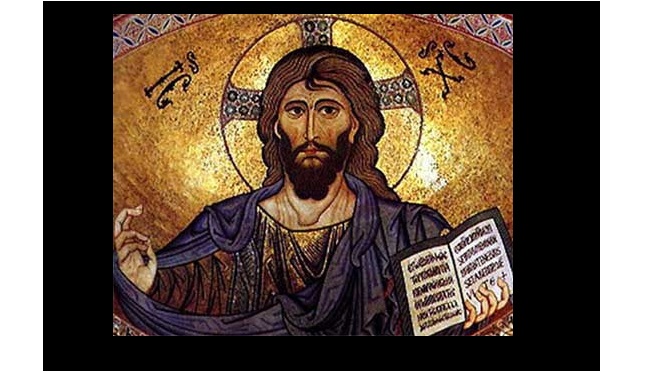
The primacy of Christ
A common complaint I have about many sermons is that they talk about many things but neglect what is important, namely the absolute primacy of Christ. We all welcome a few words of humor and general greetings at the beginning, but I expect more than generalities with little biblical substance.
No text is more compelling about the primacy of Christ than the early Christian hymn in the letter to the Colossians. “He is the image of the invisible God, the first born of all creation.” Adam and Eve were created at the image and semblance of the creator seen face to face in the Genesis story but Christ is the very image of God, not the visible God of the creation narrative, but of the invisible God whom no one has ever and will ever see alive. “In him were created all things in heaven and on earth, the visible and the invisible.” At the beginning was the Word,” the Logos of the universe, and the rationality of all evolution, growth and development. It is “through him and for him that all things were created.” He is the alpha and omega, the beginning and purpose of all things; through him life makes sense, and without him the billion stars and billions of billions of molecules have no sense and no purpose.
“He is the head of the body, the church.” It is not the pastor, the pope, or the denominational board that is the head of the church; hence sermons should reflect Christ rather than the ideas of the pastor, pope, or denominational doctrine. Many Christians are only 1% Christians: they have been baptized or immersed (“baptism” in Greek means immersion) in water only, rather than deeply immersed in Christ throughout life. Baptism is a rite of passage through which one puts on the white garment of Christ; it is only a beginning, the passage into a new life, not a one-day celebration after which one can throw away one’s new garment. Through baptism one is introduced into a Christian community for mutual support. When people are only 1% Christian, they do not see the church as their common body in Christ but only as their local pastor-run parish, and they feel little need to participate in it except minimally on Sundays.
Christ is not only the firstborn of all creation, he is also “a [new] beginning, the firstborn from the dead,.” not only the firstborn of creation but also the beginning of a new creation. Hew is the new life, the life of hope and eternity. He is not only the alpha but more importantly the omega of all things, the ultimate point to which all creation converges.
“All creation is groaning in labor pains” for its ultimate transformation. We know that there is something wrong with the world as it is with its violence and pain; even the stars collapse, explode, and vanish, and there is pain in all sentient beings; all things end in death. But if this is so, the universe has no meaning: why be born if its ultimate end is destruction? “We have the first fruits of the Spirit; we also groan within ourselves as we wait for adoption, and the redemption of our bodies.” As Christ is the firstborn from the dead, we will we be reborn, having been “predestined to be conformed to the image of the Son” in life and resurrection.
After reading such beautiful texts, how can a preacher not be inspired? Why not just quote the texts themselves? After all, it is Christ who is the head of the church and the head of preachers. But why blame preachers? We all have access to the word of God. Read the letter to the Colossians, and let's make Christ the center of our lives, days in, days out. He is our hope.
January 26, 2020

Living by faith and good works
Life is often like jumping from one cliff to another. Training and preparing for it helps, but what if the next cliff is slippery and one falls off? There is no preparation for the unexpected, and one has to have faith in a higher power.
Both faith and works are necessary, but the balance between the two is not easy. “A person is justified by faith apart from the works of the law.” (Rom 3:28) and "A person is justified by works and not by faith alone” (James 2:24). The two statements "faith apart from work" and "not faith alone" are complementary, not opposed. However, more often than not we live by one or the other, rather than both.
When we wake up, we often think of the things to do during the day, but where is faith then? We should first praise God for another day and put our trust in him, and then plan the day. The same way at night, we could say with the Psalmist, "I fall asleep in peace the moment I lie down because you alone, O Lord, enable me to live securely" (Ps 4:8).
When late on the way to work, we may speed up and worry. That's when trust is needed: all the hairs of our head are counted; we should not be afraid; we are worth more than sparrows. Of course next time we should leave home earlier in order not to be late. In a traffic jam, it is hard to live by faith; it is easier to live by anxiety and our own efforts. Throughout the day, we are constantly disturbed by people who infringe on our schedule; then it is easy to get aggravated. Then we should remember, "People of little faith, where is your reliance on God?" A relaxed confidence in God combined with our own effort is more effective than anxious multi-tasking.
There are also some very serious issues like ill-health, money problems, conflict, unemployment, addiction, depression, family disintegration, etc. There is very little we can do. We can, however, constantly lament to God in trust, and more often than not we discover ways that may help. Strange: when relying on God we discover ways to work for improvement, while obsessing on ways to improve, we may sink into despair.
There are ultimate situations of apparent forsakenness, like that of Jesus in Gethsemane. Then God seems absent, even distant. Then, strangely, we have to rely on our own forces and say, “Father, your will be done, not mine,” and ultimately, “Into your hands I commit my spirit.” Then the one who raised Jesus from the dead will also raise our spirit out of despair and give us hope.
January 19, 2020

Pleasant addictions
Most addictions are pleasant and normal. If you like chocolate or ice-cream (as I do), you want more of it. When we like a given TV program or movie, we want more of the same kind. If we like to listen to music on our i-pad or cell-phone, we like to listen whenever possible. My in-laws liked to have a drink before dinner, so I started doing the same and soon it became a habit. After a while I realized that a strong drink before dinner sapped my energy for the rest of the evening. Pleasant addiction? Yes, but addiction nonetheless. Is ice-cream pleasant? For sure, but too much makes one overweight.
Look at the fellow on the above picture: he is completely wrapped up in his pleasant addictions—pleasant, yes: pizza on the floor, cell-phone music, and instant/constant messaging—but after a few years he will be a nerd, unable to ask a girl for a dance, hike on a mountain trail, or enjoy a sunset. Fast food is pleasant, but limited in nutrients and food exploration. After a few years of smoking or a fast-food died, one's taste for good food will be as dull as fast food itself.
The most precious thing in life is time: once your life-time is up, that's it! The average American watches close to four hours of television per day or 35 hours per week. Of these about a third is advertisement. And then there are the cell-phones. "If you wonder why you never have any time to do anything, you might want to look at the culprit that is causing the time suck: Your smartphone." On average Americans spend 5.4 hours a day on their phone, and teenagers even more. The problem is not television watching, the problem is too much of it. "No one can serve two masters," God and one's preferred addictions. The problem is that we do not make enough room in one schedule for reading a good book, prayer and silence. One hour in silence may be more productive than ten hours of busyness.
Shopping is another pleasant addiction. How many pairs of shoes or outfits do we need? Most homes are cluttered with too many things which end up in the house attic, the garage, or a land-fill. The Sabbath was instituted for both rest and worship; we often do none.
What would you do with four extra hours of free time a day? That is, one hour of television instead of four and only half an hour on the phone. At first you would be bored, because we are used to our given routine. After recovery, alcoholics or chain smokers recover the taste for life, and so will it be for us after giving up some of our addictions. When getting up, we will feel fresh for another great day, and praise God for it. Gardening is great for those who have the space, but fresh flowers in the living room also bring joy to the senses. God's world is a garden to be explored. Then you may sing with the psalm 8:
When I consider your heavens, the work of your fingers,
the moon and the stars, which you have set in place,
what is mankind that you are mindful of them, human beings that you care for them?
You have made them a little lower than the angels and crowned them with glory and honor.
January 12, 2020
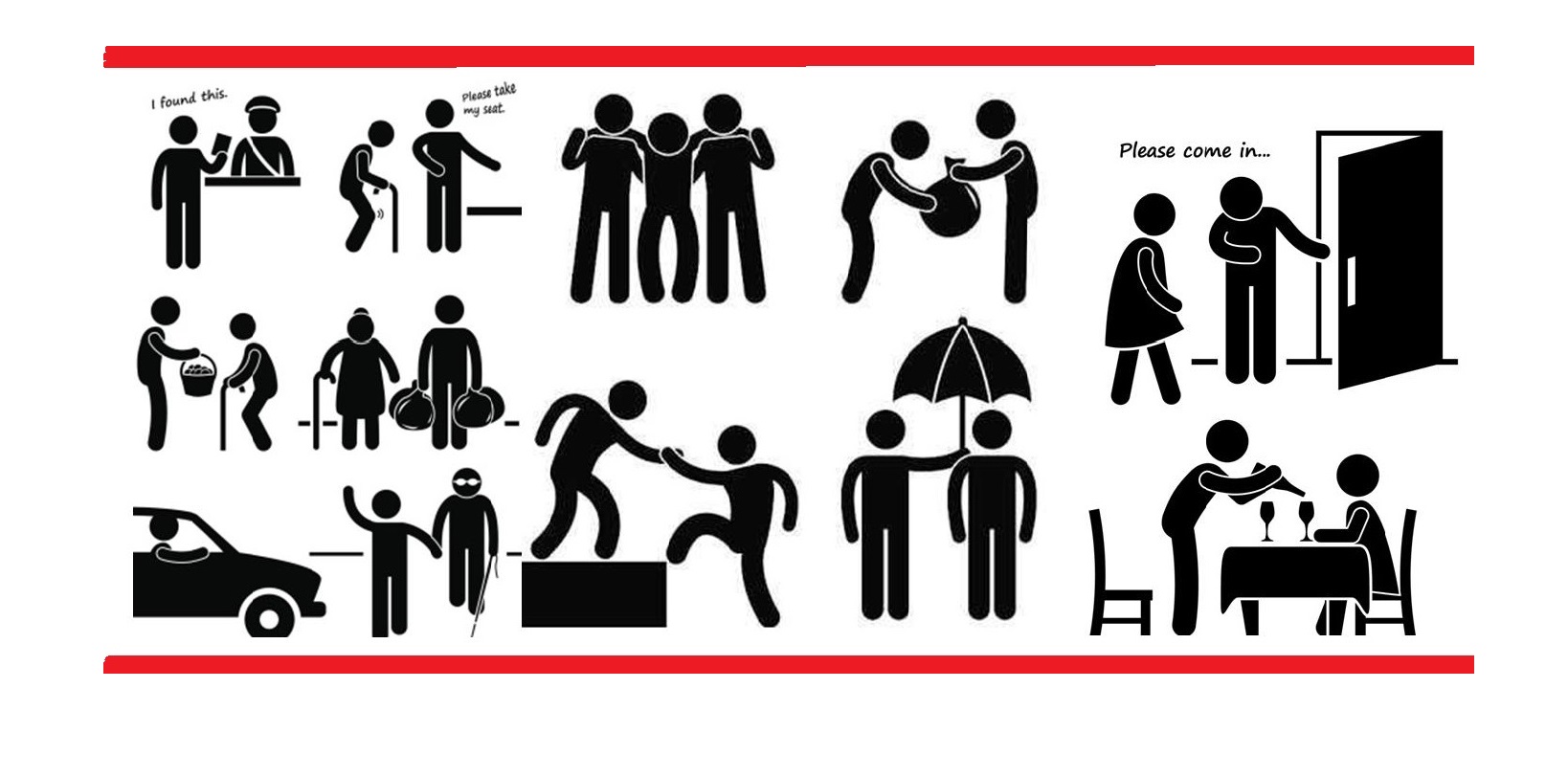
Golden Rule Christians
“Do unto others as you would have them do unto you” (Matt. 7:12). People who practice this basic rule are worthy of our admiration. They show a sense of compassion and do good whenever they can. For many people this is their main rule of conduct. In a research across nineteen congregations it was found that in most mainline churches this rule is the core of their spirituality and top priority. Golden Rule Christians care for friends, family, neighborhood, and their religious community. They are not very interested in doctrines: for them the bible is mainly as a moral guide, not much more. (See: https://wcfia.harvard.edu/files/wcfia/files/832_golden_rule_christianity.pdf/)
The Golden Rule is is found in all religions and is accepted by non-believers. Here is the weak point: one does not need the church to practice the Golden Rule, and one does not need even any religion. The children of Rule Christians may drop out of church and even religion: I don't need anybody to tell me what to do! Besides, I follow the Golden Rule whenever I can. — Really?
These Golden Rule Christians may be blind to their own condition of addiction, self-centeredness, consumerism, prejudices, lust, gluttony, greed, laziness, anger, envy, pride, and much more. What happened to the good traditional virtues of temperance, charity, diligence, patience, kindness, and humility? What happened to conscience? Look at our politicians: where is their conscience? The language of the day is about hatred and revenge on both sides of the fence. Much more is needed than the Golden Rule. I plan address each of these topics but today I only want to point to secularization.
In a pluralistic society, secularization is a good thing: no religion should dominate the public square which should remain neutral at all times. But this situation had led to the secularization of consciousness: we are so active in work and consumption that our lives have become secularized. Secularization of consciousness is widely destructive: there is little or no moral consciousness in politics and business, in work and leisure activities. Self-interest tends to be the core of all activities: education is for making money in the future, marriage is for self-realization, leisure time is for individual fun, religion is for individual salvation or just individual gratification. We are too busy to have time to pray and become involved in church. God? He is so far away from everyday life that we may just forget about it.
The antidote? Make time for God. There is nothing more powerful than music for creating a certain mood and so it is about religious music. Taizé is a Protestant-Orthodox-Catholic monastery that attracts about 10,000 young people every year, often staying for a whole weak. They come from all over Europe (and the world) to pray and sing. Their songs are short and powerful. Listen to one of their songs — a powerful repetition of only three words. Listen and sing along! It will create a mood for the whole day or even days. Try it!
January 5, 2020

The manifestation of Christ to the world
but God is often veiled in the US
The word epiphany means manifestation or revelation in Greek. The story of the three wise men is quite extraordinary. They learned that the king of the Jews was born, based on a star: "We have seen his star in the East, and we have come to adore him." Clearly they thought he was more than an ordinary king, because they came to adore him. After visiting Herod, they saw the star again and it led them to the place where the child was born. When they saw the child in a manger and the parents in a make-shift cover, they were not repulsed; on the contrary "they fell down and adored him." This is an extraordinary manifestation of faith in the one whose light will shine as the new star of the world.
This faith in the invisible reality of God is often veiled in the Western societies today. It seems that the only God our money-centered society recognizes is that of the Golden Calf, because people hope it will bring gold to its followers. No one can serve two masters, God and Mammon; more often than not, the Mammon of money wins the battle.
Secularization is a growing force. It is not opposed to religion; it simply has no room for it. At the individual level, secularization comes from being so busy that we have no time left for anything but immediate activities. The work week has been reduced from 48 to 40 hours, and there is a trend toward the 35 hour week, but the more time we have the busier we become. Cell phones are a blessing because we can get information and send messages from anywhere on the planet, but instead of having more free time, we are just busier. Students learn early in life that they can do many things at the same time, like doing homework, listening to music, and eating pizza, but the results is poor eating and working habits; it may even produce poor work and an upset stomach. We do not wait until the last days before Christmas; we begin on black Friday, but often it means a six week shopping frenzy. How secularized or non-secularized has your Christmas preparation and celebration become? This is an opportunity to reflect about it.
There is, of course, the secularization of the environment, the stores, the streets, and the networks. We live in a pluralistic society where all religions are respected while in much of the world, minorities are persecuted: Christians in Muslim countries, Muslims in Hindu India, Muslims in Buddhist Myanmar, Christians and Muslims in China. In all these countries the majority oppresses the minorities, but in the West, no-religion tends to be the majority religion, and most of the social media and businesses cater to it. Because our natural tendency is conformity, we go along with the no-religion trend. Most people decorate their homes for Christmas; with what? Santa Claus, mythic angels, and reindeers. No! It is time for Christians to decorate their homes with lots of lights, lots of lights… around the crèche, the Light of lights. Christians should say: We have seen his star, and we have come to adore him," and they must show it inside their homes in their celebration of the birth of Christ and outside their homes in decorations that manifest Christ to the world. So come, let us adore him! Sing joyfully,